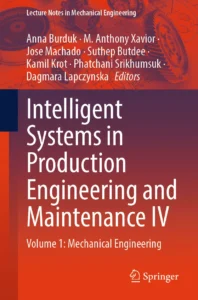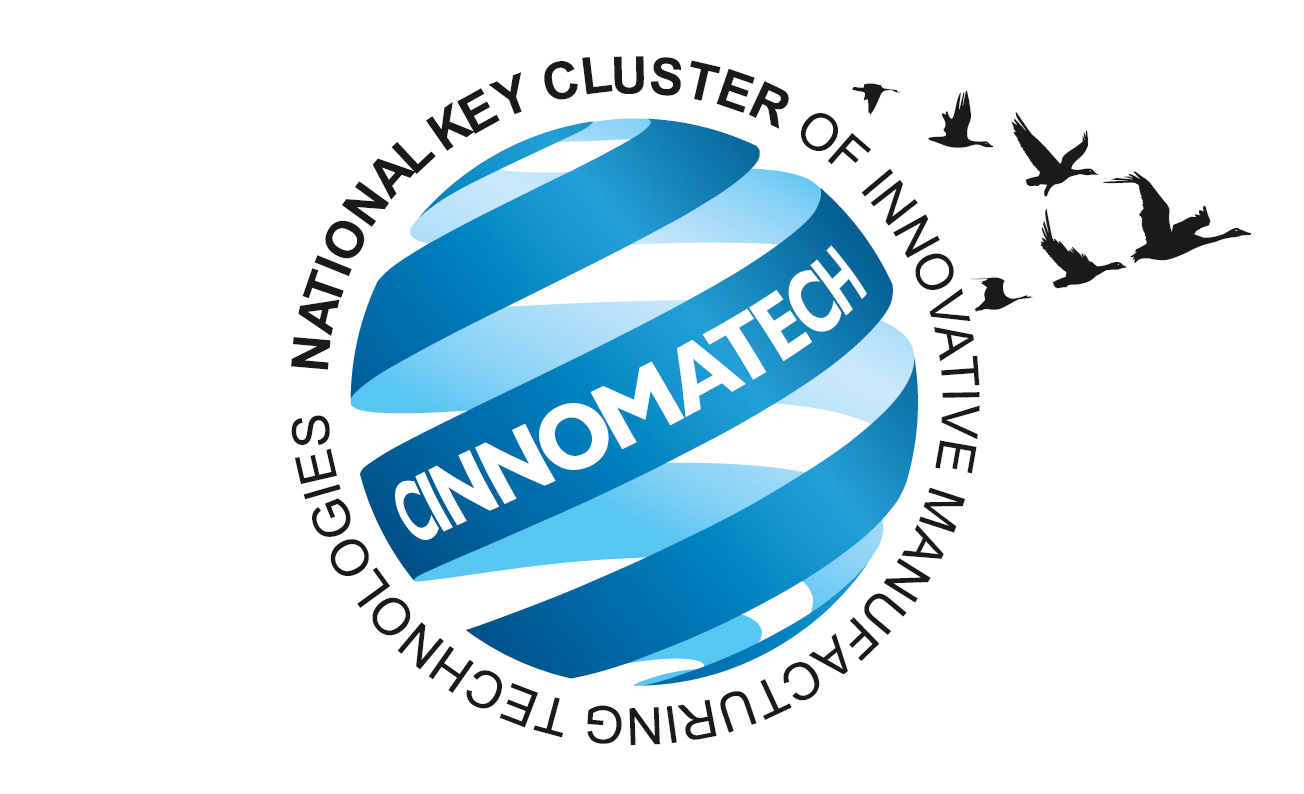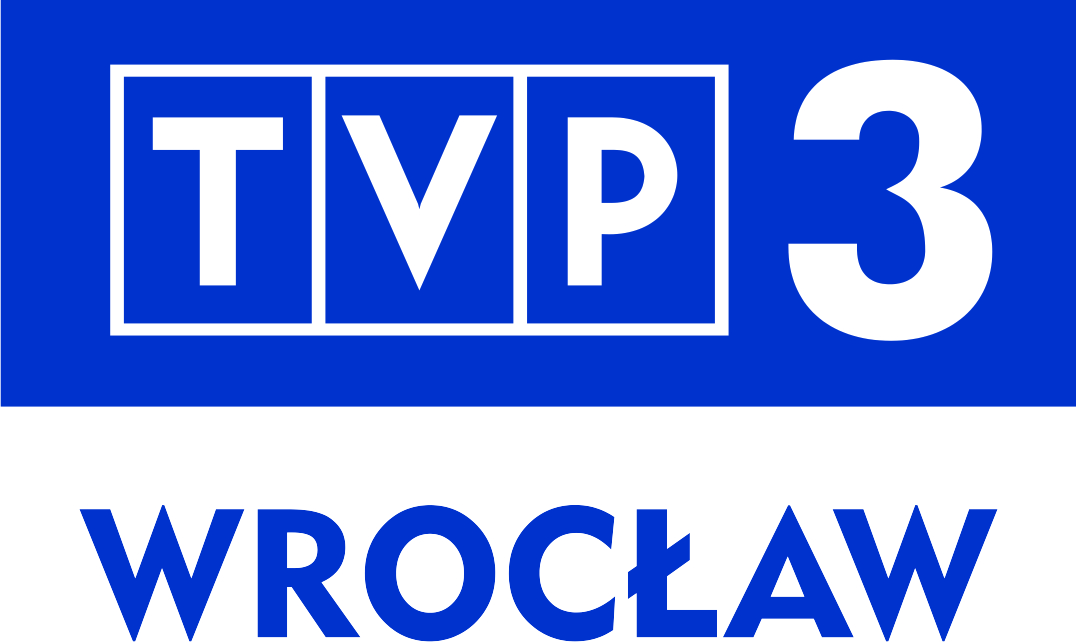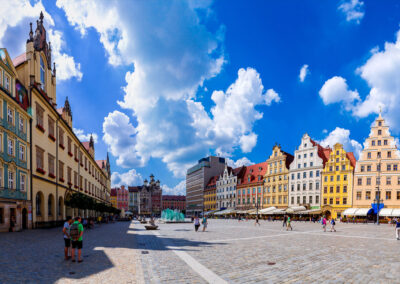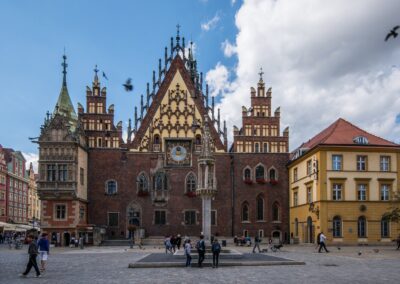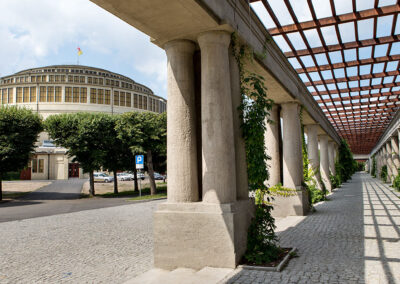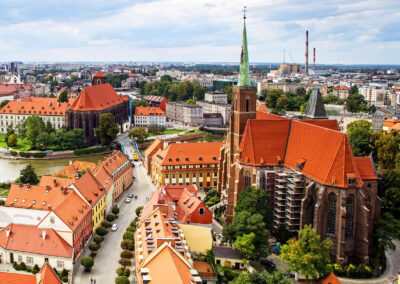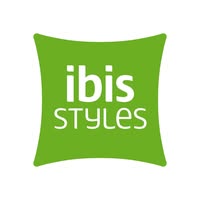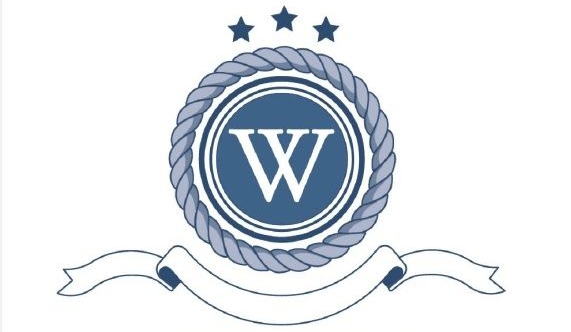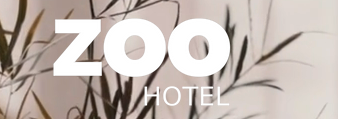The Fifth International Conference on Intelligent Systems in Production Engineering and Maintenance ISPEM 2025
25-27.06.2025, Wrocław University of Science and Technology, Poland
THE CONFERENCE PROCEEDINGS ARE ALREADY AVAILABLE
|
|
Intelligent Systems in Production Engineering and Maintenance IV
Volume 1: Mechanical EngineeringVolume 2: Production Engineering |
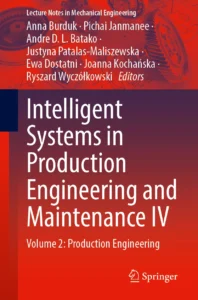 |
INTERNATIONAL DEBATE: THE RISE OF AI IN THE MANUFACTURING INDUSTRY
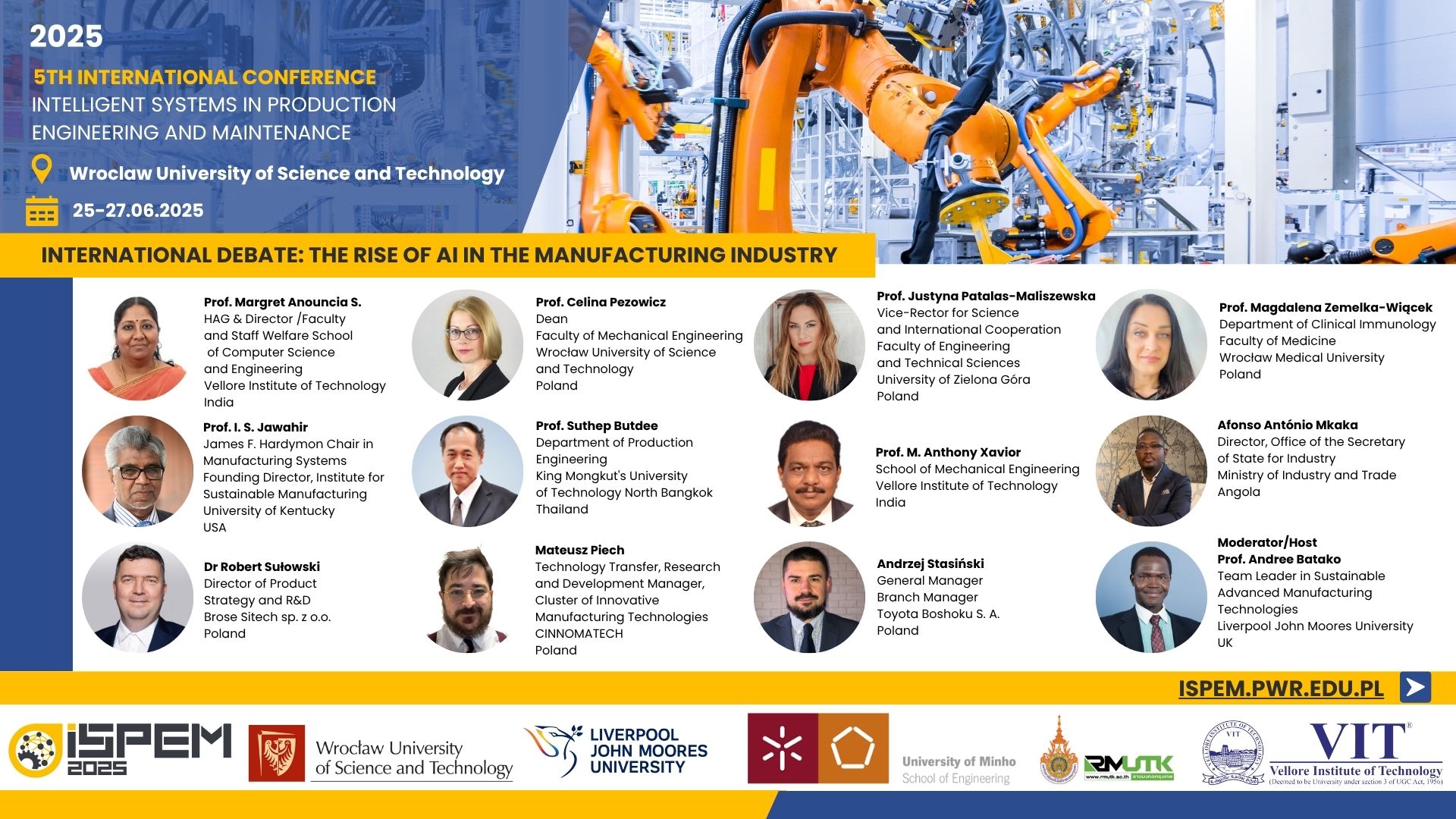
Countdown to conference date
Day(s)
:
Hour(s)
:
Minute(s)
:
Second(s)
Conference
About ISPEM 2025
The Fifth International Conference on Intelligent Systems in Production Engineering and Maintenance ISPEM 2025 will be held in Wrocław (Poland) between the 25th – 27th June 2025. The upcoming conference will be organized by five universities from five countries, namely: Wrocław University of Science and Technology (Poland), Liverpool John Moores University (England), the University of Minho (Portugal), Rajamangala University of Technology Krungthep (Thailand) and Vellore Institute of Technology (India).
The conference’s aim is to give an opportunity for researchers, experts, practitioners and other interested participants to exchange experiences in the intelligent systems, and tools applications in production, and maintenance. New solutions for innovative plants, research results and case studies considering advances in maintenance and production from the Industry 4.0 point of view will be presented and discussed. Special attention will be paid to the application of intelligent systems, methods and tools in production, maintenance, logistic, quality management, information systems, product development, ect.
Organizers:

Platinum Partners:
Gold Partners:
Media Patrons:
Co-Organizers:
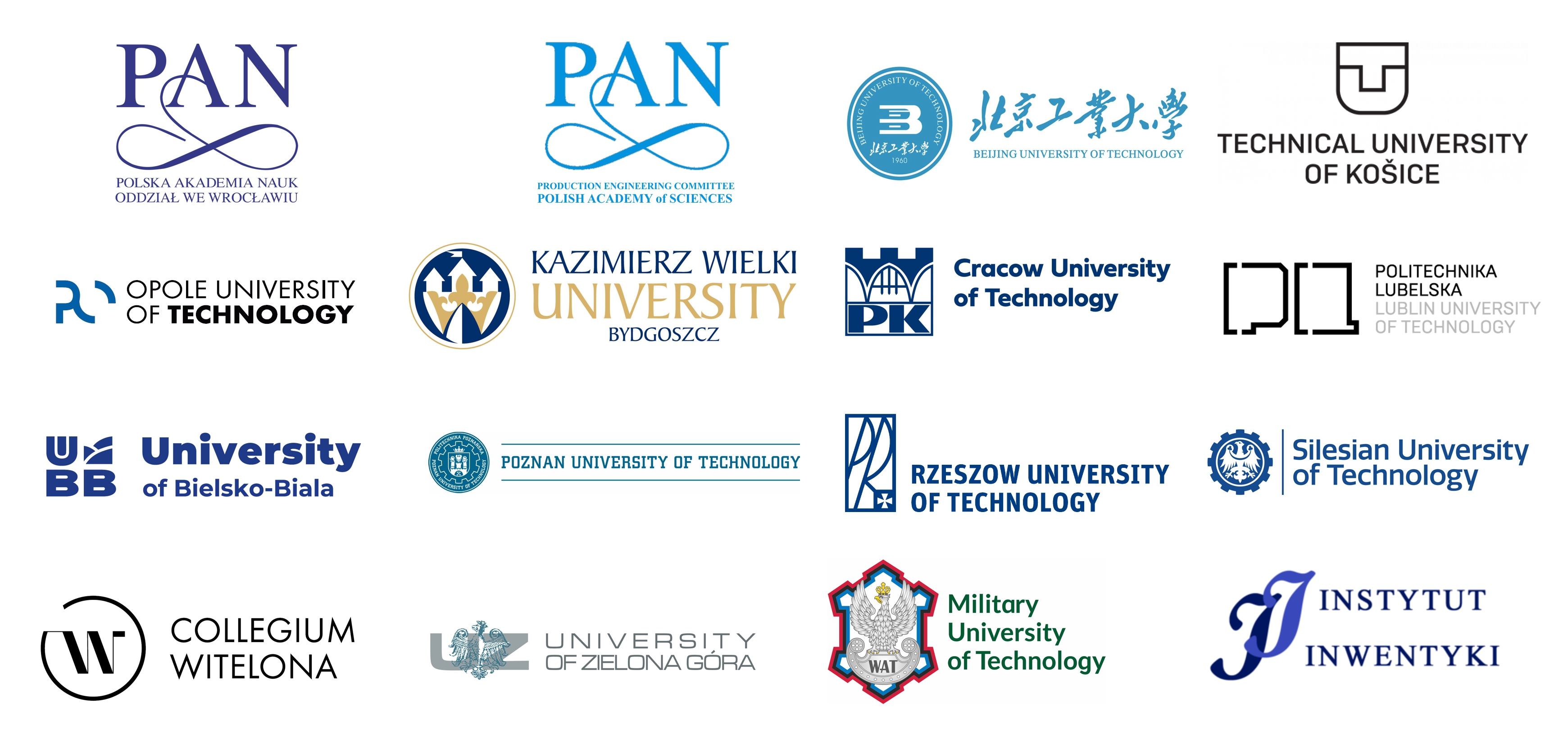
Supported by:

Topics
- Production Systems Management and Maintenance
- Manufacturing Technology & System Engineering
- Industry 4.0 and Industry 5.0
- Production System Organization
- Production Planning and Scheduling
- Maintenance Planning and Scheduling
- Modelling, Simulation and Design
- Project Management
- Quality Management
- Lean Management
- Cyber-Physical Systems
- Robotics
- Control and Supervision
- Automation Measuring Systems and Sensors
- Integration of Organizational and Technical Production Preparation
- Supply Chain Management
- Reliability & Risk Assessment
- Knowledge Discovery and Data Mining
- Green Production and Circular Economy
- Knowledge Management and Decision Support Systems in Production
- Cloud and Distributed Manufacturing
- Advanced Aerospace Material and Composites
- Machining/Forming of Advanced Materials
- Human Aspects in Industry
- Medicine 4.0
Keynote Speakers
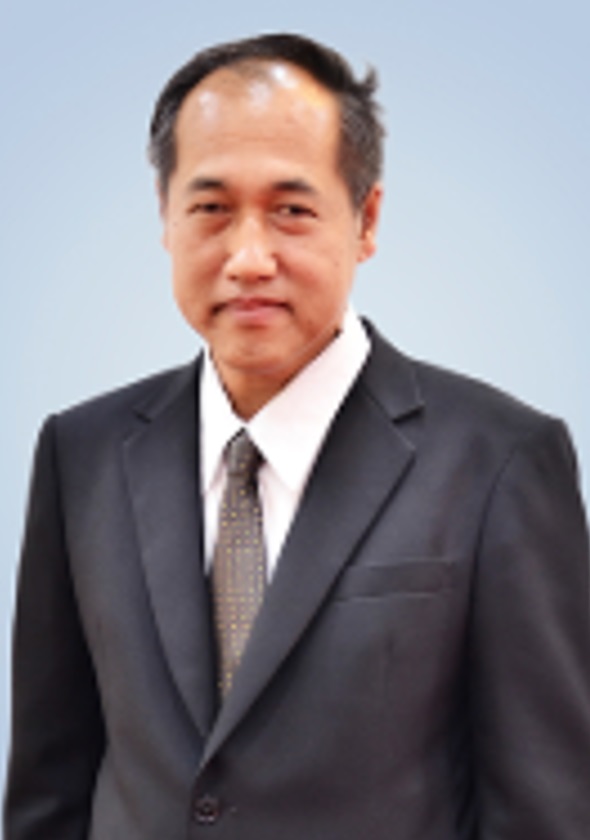
Suthep Butdee
Assoc. Prof. Dr. Suthep Butdee received PhD. in Manufacturing Engineering at Queensland University of Technology in Brisbane, Australia in 1998. He was appointed as a lecturer in the production engineering and robotics at King Mongkut’s University of Technology North Bangkok (KMUTNB), Thailand. He is associate professor in Production Engineering. His specialty and interest are in the Effective Design for Manufacturing, Expert System, production management, Robotics, Cyber Physical System. He was the Chairman of the double degree in Production Engineering for King Mongkut’s University of Technology North Bangkok and Grenoble Institute of Technology (INPG). He established a high reputation excellent research center namely Integrated Manufacturing System with financial support from the KMUTNB since 2000 and served as the director for 20 years.
Show More
He involved with research and industrial academic services for more than 28 years. In research management, he was Vice president for research and development at KMUTNB for 4 years and Deputy Director Franco-Thai innovation center at KMUTNB responsible for Automation at KMUTNB for 10 years. He jointed research with Grenoble INP University in France in the domain of collaborative design, knowledge management, and process planning in aluminum extrusion dies design. He was the Director of the double degree in Production Engineering for Thailand side. He sat as the Jury of many double PhDs degree. He received several research grants from France and Thai government under the Higher Education Commission and national research council. For academic processional service, he received lots of projects for more than 20 years at KMUTNB under the Department of Industrial Promotion, Ministry of Industry. He was the projects director for consulting more than firms 500 companies in various industrial sectors. He was the principle supervisors for PhD more than 20 graduated Doctors. He published Journal in Scopus and Elsevier for more than 70 papers and few book chapters. In 2022, he retired from the KMUTNB and moved to continue his active research in the domain of Automation and Robotics Engineering at RMUTK. His research focuses on Autonomous mobile robots, Industrial arm robots, simulation and modeling of industrial 4.0 and 5.0 environment. In addition, he is developing the research domain on automation embedded system, OPCUA and MRI for cyber and physical systems, machining learning, AI and intelligent system, intelligent prediction manufacturing system, and advanced intelligent machining processes.
Cybernetics Intelligent Production Simulation with Connectivity Platform
Industrial 4.0 towards 5.0 with digital transformation tools of cyber-physical systems, digital twins, and cybernetic production system renovates is concerned with flexibility, adaptability, integrality, and convertibility. Cybernetic includes smart automation, interconnectivity, machine learning, real-time data acquisition, and control through smart sensors connected to the internet-network cloud computing. The applications include smart factories, smart machines, smart health monitoring, and smart home appliances. Predictive manufacturing management supports big data analytics. AI with ROS system makes autonomous intelligent mobile robots. Cybernetic manufacturing includes cyber–physical network with data exchange protocols, storage, recovery, security, communication, and integration in all production units. Embedded real-time systems in industry automation 4.0 rely on cybernetics technologies to create smart products and new automated processes. The cyber-physical system coupled with the digital twin creates connectivity and execution between data analysis and decision making to smart machines, and robotics in a shop floor environment by using standardization and universality of the OPCUA plate form. This presentation shows the projection of the significant tools for the 3D virtual simulation on the production system automatically connected to the factory production process via an efficient network system. The statistical data on informatics highlights the projected growth of the smart factory sector in the Southeast Asia region, with a focus on its establishment through 2032. In 2022, the smart factory market in the Asia-Pacific accounted for 37% of the global market share, and forecasts indicate this share will surge to over 45% by 2032, reaching an estimated value of $985.5 billion. On the other hand, the case study will present the research project and outcomes from the Laboratory of Digital Twin Cybernetics Engineering at RMUTK, Bangkok, Thailand.
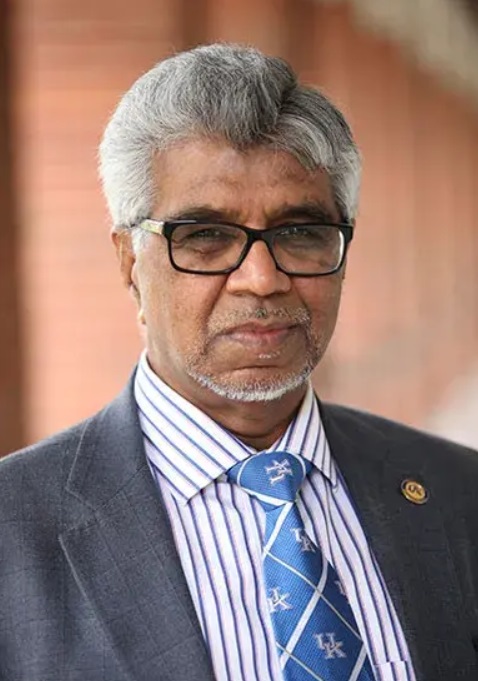
I.S. Jawahir
Dr. I.S. Jawahir is a Professor of Mechanical Engineering, James F. Hardymon Chair in Manufacturing Systems, and Founding Director of Institute for Sustainable Manufacturing at the University of Kentucky. His current research focuses on modeling and optimization of sustainable manufacturing processes and product design for circularity.
He has published extensively with over 450 research publications, including 175+ journal papers; awarded with 5 U.S. patents; delivered 82 keynote/plenary presentations in major international conferences and over 160 invited presentations in 40 countries. He has received significant research funding (over $70M) from US federal agencies and from numerous industry groups. He has also directed/supervised the research of 26 postdoctoral researchers, 52 PhD graduates and over 100 MS graduates.
Show More
He is a Fellow of three major professional societies: CIRP (International Academy for Production Engineering), ASME (American Society of Mechanical Engineers) and SME (Society of Manufacturing Engineers). He is also the Editor-in-Chief of International Journal of Sustainable Manufacturing and Technical Editor of Journal of Machining Science and Technology. In 2005, he established the ASME’s Research Committee on Sustainable Products and Processes and served as the Founding Chairman for six years (2005-11). He has been active in international collaborative research through CIRP since 1990: led five CIRP research groups; founded the CIRP Conference Series on Modeling of Machining Operations in 1998; co-founded the CIRP Conference Series on Surface Integrity in 2012; and continued to play a major role in the Global Conference on Sustainable Manufacturing (GCSM) series since its founding in 2004. He currently serves as the Chairman of the CIRP’s IMPACT (Integrated Machining Performance for the Assessment of Cutting Tools) Cooperative Research Group (2021-2025).
Professor Jawahir received numerous awards and honors, including the 2013 ASME Milton C. Shaw Manufacturing Research Medal, 2015 William Johnson International Gold Medal, 2022 SME Frederick W. Taylor Research Medal and the 2023 ASME Kos Ishii – Toshiba Award. He was also awarded with the 2015 Distinguished Visiting Professorship by the Royal Academy of Engineering, United Kingdom.
Product Circularity for Digitally Integrated Sustainable Manufacturing Systems
Sustainable Manufacturing (SM) is the enabler for Circular Economy (CE) involving multiple closed-loop material/information flows with 6Rs (Reduce, Reuse, Recycle, Recover, Redesign and Remanufacture). Total Life cycle (TLC) considerations involving four life cycle stages (Pre-manufacturing, Manufacturing, Use and Post-use), integrated with 6Rs, help facilitate sustainability transformations in manufacturing for economic, environmental and societal benefits. Designing circular products with 6R considerations is essential for digitally integrated sustainable manufacturing systems (SSMS) across the entire value chain.
This presentation will focus on circular product design driven by the CE targets in manufacturing. Current sustainable manufacturing practices will be summarized with an emphasis on achieving product circularity as the first necessary step towards process and system innovation for advancing SSMS. Quantifiable metrics-based product circularity analysis will be presented. Recent progress in product circularity studies including standards development and industry practice guidelines will also be presented.
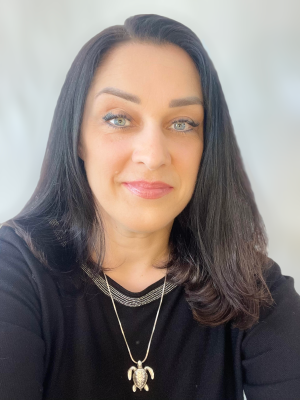
Magdalena Zemelka-Wiącek
Dr. Magdalena Zemelka-Wiącek is an Associate Professor at the Department of Clinical Immunology, Faculty of Medicine at Wroclaw Medical University, Poland. Dr. Her research focuses on plastics’ influence on human health, allergen immunotherapy, and asthma. She is actively involved in the European Academy of Allergy and Clinical Immunology (EAACI) as Deputy Editor of the Knowledge Hub and serves on the Editorial Board of the Allergy journal. Dr. Zemelka-Wiącek has led research projects, including her role as Principal Investigator on studies related to nanoplastics’ effects on immune function. She regularly presents at international conferences and is deeply committed to teaching and mentoring, supervising PhD and master’s students.
Nano- and Microplastics Exposure and Implications for Human Health
The presentation “Nanoplastics Exposure and Implications for Human Health” by Dr. Magdalena Zemelka-Wiącek explores the potential health risks associated with nanoplastics. It covers the types of plastics, their degradation into micro- and nanoplastics, and the routes of human exposure, including ingestion, inhalation, and skin contact. The presentation discusses the biological impacts of nanoplastics, highlighting in vitro studies showing cellular uptake, mitochondrial impairment, and potential links to diseases such as asthma, cancer, and inflammatory bowel disease. It emphasizes the need for further research on the health effects of nanoplastics and the environmental risks posed by their widespread presence.
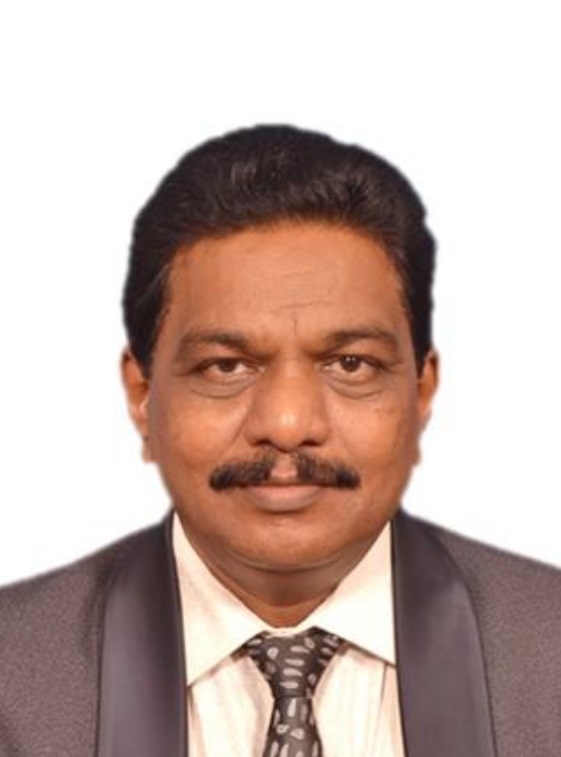
M. Anthony Xavior
Dr. M. Anthony Xavior is a Professor in Manufacturing Engineering, the School of Mechanical Engineering at Vellore Institute of Technology (VIT), Vellore, India. He has been with VIT since Feb. 1999 involved in teaching, research and various academic administrative roles. His research specialization includes machinability study on hard and difficult-to-cut materials, development and property evaluation of metal matrix composites, High Entropy Alloys and metal additive manufacturing. He had received research grants from VSSC, Thiruvananthapuram (Department of Space) for machinability analysis of Inconel 718 & SS 316.
Show More
He also received a research grant from the Aeronautics Research and Development Board (AR&DB), and the Science and Engineering Research Board (SERB) Government of India respectively for the development of composites suitable for various applications. He has published around 210 papers in international and national journals and conference proceedings in the area of materials and manufacturing. He has visited various institutes in USA, UK, China, Australia, New Zealand, France, Czech Republic, Poland, Thailand and Singapore for various academic and research purposes. He is a member of ASME, Life Member of the Indian Society for Technical Education and a Life Member of the Institution of Engineers (India). He appears consistently in the list of the Top 2% of Scientists in the world as per the study undertaken by Stanford University & Elsevier. To learn more about Prof. Anthony’s contribution, visit his website: https://sites.google.com/view/drmanthonyxavior
Unleashing the Future of Advanced Materials Featuring Carbon-Reinforced Eutectic High Entropy Alloys
Eutectic high-entropy alloys (EHEAs) have garnered significant attention among the metallic materials community because of their excellent castability, fine and uniform microstructures high strength, and good ductility. Generally, there are two types of EHEAs: The first one comprises two hard phases, such as BCC/B2 phases which are not suitable for loadbearing structural applications but can be used as functional materials. The second one has a hard phase and a soft phase, such as FCC+BCC (B2) or FCC/intermetallic phases, which generally exhibit excellent mechanical properties and can be used for load-bearing structures. However, the introduction of carbon-based reinforcement such as multi-walled carbon nanotubes and Graphene in the EHEAs is not available in the literature. The development of FeCoCrNi-based equiatomic EHEAs with the addition of carbon-based reinforcements, the phase structure, microstructure, and mechanical behaviour of the newly developed EHEAs will be addressed in this presentation.
Committee
Conference Chair:
Anna Burduk, Wrocław University of Science and Technology (Poland)
Conference Co-Chairs:
Andre DL Batako, Liverpool John Moores University (UK)
José Machado, University of Minho, School of Engineering (Portugal)
Phatchani Srikhumsuk, Rajamangala University of Technology Krungthep (Thailand)
M. Anthony Xavior, Vellore Institute of Technology (India)
Program Committee:
Antonelli Dario, Politecnico di Torino (Italy)
Antosz Katarzyna, Rzeszow University of Technology (Poland)
Avram Camelia, Technical University of Cluj-Napoca, (Romania)
Banaszak Zbigniew, Koszalin University of Technology (Poland)
Batako Andre, Liverpool John Moores University (UK)
Będza Tomasz, Wrocław University of Science and Technology (Poland)
Bień Jan, Wrocław University of Science and Technology (Poland)
Błażej Ryszard, Wrocław University of Science and Technology (Poland)
Bocewicz Grzegorz, Technical University of Koszalin (Poland)
Borucka Anna, Military University of Technology (Poland)
Burduk Anna, Wrocław University of Science and Technology (Poland)
Butdee Suthep, Rajamangala University of Technology Krungthep (Thailand)
Chaszczewska-Markowska Monika , Polish Academy of Sciences (Poland)
Chodakowska Ewa, Bialystok University of Technology (Poland)
Chudjuarjeen Saichol, Rajamangala University of Technology Krungthep (Thailand)
Cyplik Piotr, Poznan University of Technology (Poland)
Damasevicius Robertas, Kaunas University of Technology (Lithuania)
Davidrajuh Reggie, University of Stavanger (Norway)
Dąbrowska Magdalena, Collegium Witelona (Poland)
Dereń Aldona Małgorzata, Wrocław University of Science and Technology (Poland)
Diakun Jacek, Poznan University of Technology (Poland)
Dostatni Ewa, Poznan University of Technology (Poland)
Dulina Luboslav, University of Žilina (Slovakia)
Gawlik Jozef, Cracow University of Technology (Poland)
Gola Arkadiusz, Lublin University of Technology (Poland)
Golińska-Dawson Paulina, Poznan University of Technology (Poland)
Grabowik Cezary, Silesian University of Technology (Poland)
Grabowska Sandra, Silesian University of Technology (Poland)
Grudowski Piotr, Gdańsk University of technology (Poland)
Grznár Patrik, University of Žilina (Slovakia)
Grzybowska Katarzyna, Poznan University of Technology (Poland)
Gwiazda Aleksander, Silesian University of Technology (Poland)
Halicka Katarzyna, Bialystok University of Technology (Poland)
Helman Joanna, Wrocław University of Science and Technology (Poland)
Herbuś Krzysztof, Silesian University of Technology (Poland)
Hoła Jerzy, Wrocław University of Science and Technology (Poland)
Husár Jozef, Technical University of Kosice (Slovakia)
Hys Katarzyna, Opole University of Technology (Poland)
Ivanov Vitalii, Sumy State University (Ukraine)
Jacyna – Gołda Ilona, Warsaw University of Technology (Poland)
Jagielski Dariusz, Centre for Heart Diseases 4th Military Hospital (Poland)
Jasiulewicz-Kaczmarek Małgorzata, Poznan University of Technology (Poland)
Kaczmarska Bożena, Kielce University of Technology (Poland)
Kuczyńska-Chałada Marzena, Silesian University of Technology (Poland)
Jardzioch Andrzej, West Pomeranian University of Technology in Szczecin (Poland)
Jurdziak Leszek, Wrocław University of Science and Technology (Poland)
Karoluk Michał, Wrocław University of Science and Technology (Poland)
Kasprzyk Rafał, Military University of Technology (Poland)
Kirianów-Błażej Agata, Wrocław University of Science and Technology (Poland)
Kłos Sławomir, University of Zielona Góra (Poland)
Knapčíková Lucia, Technical University of Kosice (Slovakia)
Knapiński Marcin, Czestochowa University of Technology (Poland)
Knosala Ryszard, Opole University of Technology (Poland)
Kochańska Joanna, Wrocław University of Science and Technology (Poland)
Kocira Sławomir, University of Life Sciences in Lublin (Poland)
Koliński Adam, Poznan School of Logistics (Poland)
Kopczewski Marian, General Tadeusz Kościuszko Military University Land Force (Poland)
Kosieradzka Anna, Warsaw University of Technology (Poland)
Krajewska-Spiewak Joanna, Cracow University of Technology (Poland)
Krenczyk Damian, Silesian University of Technology (Poland)
Krot Kamil, Wrocław University of Science and Technology (Poland)
Królczyk Jolanta, Opole University of Technology (Poland)
Kuboń Maciej, Agricultural University of Krakow (Poland)
Kucińska-Landwójtowicz Aneta, Opole University of Technology (Poland)
Kulińska Ewa, Opole University of Technology (Poland)
Kuric Ivan, University of Žilina (Slovakia)
Kurzynowski Tomasz, Wrocław University of Science and Technology (Poland)
Lewandowski Tadeusz, Wrocław University of Science and Technology (Poland)
Li Nan, Beijing University of Technology (China)
Li Peng, Beijing University of Technology (China)
Liu Xiucheng, Beijing University of Technology (China)
Ładysz Rafał, George Mason University (USA)
Łapczyńska Dagmara, Wrocław University of Science and Technology (Poland)
Machado José, University of Minho (Portugal)
Maletič Damjan, University of Maribor (Slovenia)
Małysa Tomasz, Silesian University of Technology (Poland)
Markowska-Chaszczewska Monika, Polish Academy of Sciences (Poland)
Medyński Daniel, Collegium Witelona (Poland)
Mikołajewski Dariusz, Kazimierz Wielki University in Bydgoszcz (Poland)
Molasy Mateusz, Wrocław University of Science and Technology (Poland)
Monica Zbigniew, Silesian University of Technology (Poland)
Nowacki Krzysztof, Silesian University of Technology (Poland)
Olender-Skóra, Silesian University of Technology (Poland)
Paliszkiewicz Joanna, Warsow University of Life Sciences (Poland)
Pakšiová Renáta, University of Economics in Bratislava (Slovakia)
Patalas-Maliszewska Justyna, University of Zielona Góra (Poland)
Pereira Alejandro, University of Vigo (Spain)
Pihnastyi Oleh, National Technical University, Kharkiv Polytechnic Institute (Ukraine)
Plinta Dariusz, University of Bielsko-Biala (Poland)
Prządka Przemysław, Wroclaw University of Environmental and Life Sciences (Poland)
Rehm Mathias, Technical University of Chemnitz (Germany)
Rojek Izabela, Kazimierz Wielki University (Poland)
Rosienkiewicz Maria, Wrocław University of Science and Technology (Poland)
Rusińska Małgorzata, Wrocław University of Science and Technology (Poland)
Rutkowska Małgorzata, Wrocław University of Science and Technology (Poland)
Saniuk Sebastian, University of Zielona Góra (Poland)
Sioma Andrzej, AGH University of Science and Technology (Poland)
Skoczypiec Sebastian, Cracow University of Technology (Poland)
Skonieczny Jan, Wrocław University of Science and Technology (Poland)
Smolina Iryna, Wrocław University of Science and Technology (Poland)
Srikhumsuk Phatchani, Rajamangala University of Technology Krungthep (Thailand)
Stadnicka Dorota, Rzeszow University of Technology (Poland)
Stylios Chrysostomos, University of Ioanina (Greece)
Szkoda Maciej, Cracow University of Technology (Poland)
Szymańska Elżbieta, Warsaw University of Life Sciences (Poland)
Świć Antoni, Lublin University of Technology (Poland)
Świderski Andrzej, Motor Transport Insitute (Poland)
Tarapata Zbigniew, Military University of Technology, (Poland)
Tomé Eduardo, Henrique University (Portugal)
Tomporowski Andrzej, Bydgoszcz University of Science and Technology (Poland)
Trojanowska Justyna, Poznan University of Technology (Poland)
Tubis Agnieszka, Wrocław University of Science and Technology (Poland)
Ubysz Andrzej, Wrocław University of Science and Technology (Poland)
Vahonova Oleksandra, National Technical University (Ukraine)
Varela Leonilde, University of Minho (Portugal)
Wang Yujue, Beijing University of Technology (China)
Waszkowski Robert, Military University of Technology (Poland)
Werbińska-Wojciechowska Sylwia, Wrocław University of Science and Technology (Poland)
Więcek Dorota, University of Bielsko-Biala (Poland)
Wiśniewski Zbigniew, Lodz University of Technology (Poland)
Wojciechowski Szymon, Poznan University of Technology (Poland)
Woźna Anna, Wrocław University of Science and Technology (Poland)
Wyczółkowski Ryszard, Silesian University of Technology (Poland)
Xavior Anthony M., Vellore Institute of Technology (VIT) (India)
Scientific Committee:
Adamczak Michał, Poznan School of Logistics (Poland)
Adjallah Kondo H., Institut Nationale Polytechnique de Lorraine (France)
Almeida Nuno, University of Lisbon (Portugal)
Antonelli Dario, Politecnico di Torino (Italy)
Antończyk Agnieszka, Wroclaw University of Environmental and Life Sciences (Poland)
Antosz Katarzyna, Rzeszow University of Technology (Poland)
Avram Camelia, Technical University of Cluj-Napoca (Romania)
Awasthi Anjali, Concordia University (Canada)
Avila Paulo, Polytechnic Institute of Porto (Portugal)
Banaszak Zbigniew, Koszalin University of Technology (Poland)
Banaś Wacław, Silesian University of Technology (Poland)
Baraldi Piero, Politecnico di Milano (Italy)
Barni Andrea Francesco, University of Applied Sciences of Southern (Switzerland)
Basl Josef, University of West Bochemia (Czech Republic)
Basova Yevheniia, National Technical University (Ukraine)
Batako Andre, Liverpool John Moores University (UK)
Berenguer Christophe, Grenoble Institute of Technology (France)
Bernard Alain, Ecole Centrale de Nantes (France)
Bernatík Aleš, VSB Technical University of Ostrava (Czech Republic)
Będza Tomasz, Wrocław University of Science and Technology (Poland)
Białas Katarzyna, Silesian University of Technology (Poland)
Bluszcz Anna, Silesian University of Technology (Poland)
Błażej Ryszard, Wrocław University of Science and Technology (Poland)
Bocewicz Grzegorz, Technical University of Koszalin (Poland)
Bojar Waldemar, UTP University of Science and Technology (Poland)
Andrea Bonci, Università Politecnica delle Marche (Italy)
Bożejko Wojciech, Wrocław University of Science and Technology (Poland)
Bracke Stefan, University of Wuppertal (Germany)
Brodny Jarosław, Silesian University of Technology (Poland)
Bučinskas Vytautas, Vilnius Gediminas Technical University (Lithuania)
Burduk Anna, Wrocław University of Science and Technology (Poland)
Bureika Gintautas, Vilnius Gediminas Technical University (Lithuania)
Buscher Udo, Technical University of Dresden (Germany)
Čambál Miloš, Slovak University of Technology in Bratislava (Slovakia)
Capaldo Guido, University of Naples Federico II (Italy)
Cariow Aleksandr , West Pomeranian University of Technology in Szczecin (Poland)
Carreras Anna, Ramon Llull University (Spain)
Ciszak Olaf, Poznan University of Technology (Poland)
Cisar Miroslav, University of Žilina (Slovakia)
Coranič Tomáč, Technical University of Kosice (Slovakia)
Chaszczewska-Markowska Monika , Polish Academy of Sciences (Poland)
Cholewa Mariusz, Wroclaw University of Science and Technology (Poland)
Christopoulos Athanasios, University of Turku (Finland)
Chromjaková Felicita, Tomas Bata University in Zlín (Czech Republic)
Cyplik Piotr, Poznan University of Technology (Poland)
Ćwikła Grzegorz, Silesian University of Technology (Poland)
Damasevicius Robertas, Kaunas University of Technology (Lithuania)
Davidrajuh Reggie, University of Stavanger (Norway)
Dąbrowska Magdalena, Collegium Witelona (Poland)
Dec Grzegorz, Rzeszów University of Technology (Poland)
Demichela Micaela, Politecnico de Torino (Italy)
Denysenko Yuliia, Sumy State University (Ukraine)
Dereń Aldona Małgorzata, Wrocław University of Science and Technology (Poland)
Despotis Dimitris, University of Piraeus (Greece)
Deuse Jochen, Technical University of Dortmund (Germany)
Diakun Jacek, Poznan University of Technology (Poland)
Diering Magdalena, Poznan University of Technology (Poland)
Donatelli Gustavo, Federal University of Santa Catarina (Brazil)
Dossou Paul-Eric, ICAM University (France)
Dostatni Ewa, Poznan University of Technology (Poland)
Drevetskyi Volodymyr, National University of Water and Environmental Engineering (Ukraine)
Duda Jan, Cracow University of Technology (Poland)
Dujak Davor, Josip Juraj Strossmayer University Of Osijek (Croatia)
Dulina Ľuboslav, University of Žilina (Slovakia)
Dybała Bogdan, Wrocław University of Science and Technology (Poland)
Dymarek Andrzej, Silesian University of Technology (Poland)
Dzitkowski Tomasz, Silesian University of Technology (Poland)
Edl Milan, University of West Bohemia (Czech Republic)
Estrada Quirino, Universidad Autónoma de Ciudad Juárez (Mexico)
Ferreira Luis, University of Porto (Portugal)
Filipenko Oleksandr, Kharkiv National University of Radio Electronics (Ukraine)
Florin Popister, Technical University of Cluj-Napoca (Romania)
Foit Krzysztof, Silesian University of Technology (Poland)
Fomichov Serhii, National Technical University of Ukraine (Ukraine)
Frankiewicz Mariusz, Wrocław University of Science and Technology (Poland)
Fridgeirsson Thordur Vikingur, Reykjavik University (Iceland)
Fumagalli Luca, Politecnico di Milano (Italy)
Furch Jan, University of Defence (Czech Republic)
Gawlik Józef, Cracow University of Technology (Poland)
Gnitecka Ranata, The Witelon State University Of Applied Sciences In Legnica (Poland)
Gola Arkadiusz, Lublin University of Technology (Poland)
Golińska-Dawson Paulina, Poznan University of Technology (Poland)
Górski Filip, Poznan University of Technology (Poland)
Grabowik Cezary, Silesian University of Technology (Poland)
Grabowska Sandra, Silesian University of Technology (Poland)
Grajewski Damian, Poznan University of Technology (Poland)
Grall Antoine, University of Technology of Troyes (France)
Gregor Milan, University of Žilina (Slovakia)
Greenwood Allen G., Mississippi State University (USA)
Grozav Sorin, Technical University of Cluj Napoca (Romania)
Grznár Patrik, University of Žilina (Slovakia)
Grzybowska Katarzyna, Poznan University of Technology (Poland)
Gwiazda Aleksander, Silesian University of Technology (Poland)
Gyula Mester, Óbuda University (Hungary)
Habel Jacek, Cracow University of Technology (Poland)
Halicka Katarzyna, Bialystok University of Technology (Poland)
Hamrol Adam, Poznan University of Technology (Poland)
Helman Joanna, Wrocław University of Science and Technology (Poland)
Herbuś Krzysztof, Silesian University of Technology (Poland)
Hys Katarzyna, Opole University of Technology (Poland)
Hurná Soňa, Mendelova univerzita v Brně (Czech Republic)
Husár Jozef, Technical University of Kosice (Slovakia)
Ivanov Vitalii, Sumy State University (Ukraine)
Jagielski Dariusz, Centre for Heart Diseases 4th Military Hospital (Poland)
Janardhanan Mukund Nilakantan, University of Leicester (UK)
Jardzioch Andrzej, West Pomeranian University of Technology in Szczecin (Poland)
Jasiulewicz-Kaczmarek Małgorzata, Poznan University of Technology (Poland)
Jodejko-Pietruczuk Anna, Wrocław University of Science and Technology (Poland)
Jurdziak Leszek, Wrocław University of Science and Technology (Poland)
Jurko Jozef, Technical University of Kosice (Slovakia)
Kacprzyk Janusz, Polish Academy of Sciences (Poland)
Kalinowski Bartosz, University of Lodz (Poland)
Kalinowski Krzysztof, Silesian University of Technology (Poland)
Kampa Adrian, Silesian University of Technology (Poland)
Kanisius Karyono, Liverpool John Moores University (UK)
Kantola Jussi, University of Vaasa (Finland)
Karpenko Mykola, Vilnius Gediminas Technical University (Lithuania)
Karwasz Anna, Poznan University of Technology (Poland)
Kaščak Jakub, Technical University of Kosice (Slovakia)
Kasprzyk Rafał, Military University of Technology (Poland)
Kaźmierczak Jan, Silesian University of Technology (Poland)
Kirianów-Błażej Agata, Wrocław University of Science and Technology (Poland)
Klačková Ivana, University of Žilina (Slovakia)
Klarecki Klaudiusz, Silesian University of Technology (Poland)
Kłos Sławomir, University of Zielona Góra (Poland)
Knapčíková Lucia, Technical University of Kosice (Slovakia)
Knosala Ryszard, Opole University of Technology (Poland)
Kochańska Joanna, Wrocław University of Science and Technology (Poland)
Koliński Adam, Poznan School of Logistics (Poland)
Kononiuk Anna, Bialystok University of Technology (Poland)
Kopczewski Marian, General Tadeusz Kościuszko Military University Land Force (Poland)
Korytkowski Przemysław, West Pomeranian University of Technology in Szczecin (Poland)
Kozłowski Edward, Lublin University of Technology (Poland)
Krajewska-Spiewak Joanna, Cracow University of Technology (Poland)
Kujawińska Agnieszka, Poznan University of Technology (Poland)
Kulińska Ewa, Opole University of Technology (Poland)
Kurzynowski Tomasz, Wrocław University of Science and Technology (Poland)
Krajčovič Martin, University of Žilina (Slovakia)
Krause-Jüttler Grit, Technische Universität Dresden (Germany)
Krenczyk Damian, Silesian University of Technology (Poland)
Krot Kamil, Wrocław University of Science and Technology (Poland)
Król Robert, Wrocław University of Science and Technology (Poland)
Królczy Grzegorz, Opole University of Technology (Poland)
Krykavskyi Yevhen, Lviv Technical University (Ukraine)
Kuczmaszewski Józef, Lublin University of Technology (Poland)
Kumar Vijaya, VIT University (India)
Kuric Ivan, University of Žilina (Slovakia)
Kurzynowski Tomasz, Wrocław University of Science and Technology (Poland)
Legutko Stanisław, Poznan University of Technology (Poland)
Lempa Paweł, Cracow University of Technology (Poland)
Leonilde Varela, University of Minho (Portugal)
Lewandowski Jerzy, Lodz University of Technology (Poland)
Lipiec Piotr, AGH University of Science and Technology (Poland)
Litwin Paweł, Rzeszów University of Technology (Poland)
Luściński Sławomir, Kielce University of Technology (Poland)
Ładysz Rafał, George Mason University (USA)
Łapczyńska Dagmara, Wrocław University of Science and Technology (Poland)
Mabkhot Mohammed M., Loughborough University (UK)
Machado José, University of Minho (Portugal)
Macko Marek, Kazimierz Wielki University in Bydgoszcz (Poland)
Madsen Ole, Aalborg University (Denmark)
Majernik Ján, Institute of Technology and Business in České Budějovice (Czech Republic)
Makyšová Helena, Slovak University of Technology in Bratislava (Slovakia)
Maletič Damjan, University of Maribor (Slovenia)
Maščenik Jozef, Technical University of Kosice (Slovakia)
Majstorovic Vidosav, University of Belgrade (Serbia)
Matuszek Józef, University of Bielsko-Biala (Poland)
Mazzei Daniele, University of Pisa (Italy)
Medyński Daniel, Collegium Witelona (Poland)
Michalski Piotr, Silesian University of Technology (Poland)
Mikler Jerzy, KTH Royal Institute of Technology (Sweden)
Mikołajewski Dariusz, Kazimierz Wielki University in Bydgoszcz (Poland)
Milazzo Maria Francesca, University of Messina (Italy)
Mleczko Janusz, University of Bielsko-Biala (Poland)
Modrak Vladimir, Technical University of Košice (Slovakia)
Molasy Mateusz, Wrocław University of Science and Technology (Poland)
Monica Zbigniew, Silesian University of Technology (Poland)
Nagyová Anna, Technical University of Kosice (Slovakia)
Nazarko Joanicjusz, Bialystok University of Technology (Poland)
Navarro Joan, Ramon Llull University (Spain)
Nielsen Izabela Ewa, Aalborg University (Denmark)
Niewiadomski Przemysław, University of Zielona Góra (Poland)
Noel Frederic, Grenoble Institute of Technology (France)
Nowacki Krzysztof, Silesian University of Technology (Poland)
Oleksiak Beata, Silesian University of Technology (Poland)
Olender-Skóra, Silesian University of Technology (Poland)
Ottaviano Erika, University of Cassino and Southern Lazio (Italy)
Pakšiová Renáta, University of Economics in Bratislava (Slovakia)
Paprocka Iwona, Silesian University of Technology (Poland)
Patalas-Maliszewska Justyna, University of Zielona Góra (Poland)
Pasichnyk Vitalii, National Technical University of Ukraine (Ukraine)
Pavlenko Ivan, Sumy State University (Ukraine)
Pawlewski Paweł, Poznan University of Technology (Poland)
Pereira Alejandro, University of Vigo (Spain)
Peres Francois, University of Toulouse (France)
Perez Pereales David, Universidad Polytechnica de Valencia (Spain)
Pihnastyi Oleh, National Technical University, Kharkiv Polytechnic Institute (Ukraine)
Piotrowska Katarzyna, Lublin University of Technology (Poland)
Pitel’ Jan, Technical University of Kosice (Slovakia)
Plinta Dariusz, University of Bielsko-Biala (Poland)
Płaczek Marek, Silesian University of Technology (Poland)
Podrzaj Primoz, University of Ljubljana (Slovenia)
Pop Grigore, Technical University of Cluj-Napoca (Romania)
Prządka Przemysław, Wroclaw University of Environmental and Life Sciences (Poland)
Putnik Goran D., University of Minho (Portugal)
Rauch Erwin, Free University of Bolzano (Italy)
Radecka Katarzyna, Bydgoszcz University of Science and Technology (Poland)
Rea Pierluigi, University of Cagliari (Italy)
Rehm Mathias, Technical University of Chemnitz (Germany)
Rojek Izabela, Kazimierz Wielki University (Poland)
Rosienkiewicz Maria, Wrocław University of Science and Technology (Poland)
Roumpos Christos, Technical University of Crete (Greece)
Rusińska Małgorzata, Wrocław University of Science and Technology (Poland)
Rytis Maskeliūnas, Kaunas University of Technology (Lithuania)
Sachin Waigaonkar, Birla Institute of Technology and Science (India)
Safonyk Andrii, National University of Water and Environmental Engineering (Ukraine)
Saniuk Sebastian, University of Zielona Góra (Poland)
Santarek Krzysztof, Warsaw University of Technology (Poland)
Schlegel Holger, Technical University of Chemnitz (Germany)
Sękala Agnieszka, Silesian University of Technology (Poland)
Sęp Jarosław, Rzeszow University of Technology (Poland)
Siderska Julia, Bialystok University of Technology (Poland)
Simon Silvio, Brandenburg University of Technology Cottbus-Senftenberg (Germany)
Skačkauskas Paulius, Vilnius Gediminas Technical University (Lithuania)
Skołud Bożena, Silesian University of Technology (Poland)
Skonieczny Jan, Wrocław University of Science and Technology (Poland)
Smolina Iryna, Wrocław University of Science and Technology (Poland)
Srikhumsuk Phatchani, Rajamangala University of Technology Krungthep (Thailand)
Stadnicka Dorota, Rzeszow University of Technology (Poland)
Starzyńska Beata, Poznan University of Technology (Poland)
Stosiak Michał, Wrocław University of Science and Technology (Poland)
Straka Martin, Technical University of Kosice (Slovakia)
Stylios Chrysostomos, University of Ioanina (Greece)
Szymańska Elżbieta, Warsaw University of Life Sciences (Poland)
Ślusarczyk Beata, Czestochowa University of Technology (Poland)
Świć Antoni, Lublin University of Technology (Poland)
Tarapata Zbigniew, Military University of Technology, (Poland)
Tengler Jiri, University of Žilina (Slovakia)
Terzi Sergio, Politecnico di Milano (Italy)
Tomé Eduardo, Henrique University (Portugal)
Tormos Bernardo, Universitat Politècnica de Valencia (Spain)
Trebuna Peter, Technical University of Kosice (Slovakia)
Trojanowska Justyna, Poznan University of Technology (Poland)
Tubis Agnieszka, Wrocław University of Science and Technology (Poland)
Turmanidze Raul, Georgian Technical University (Georgia)
Türkyilmaz Ali, University of Stavanger (Norway)
Ulewicz Robert, Czestochowa University of Technology (Poland)
Urh Benjamin, University of Maribor (Slovenia)
Ungureanu Nicolae, Technical University of Cluj Napoca (Romania)
Vahonova Oleksandra, National Technical University (Ukraine)
Valis David, Brno University of Defence (Czech Republic)
Varela Leonilde, University of Minho (Portugal)
Vosniakos George-Christopher, National Technical University of Athens (Greece)
Waigaonkar Sachin, Birla Institute of Technology & Science (India)
Waszkowski Robert, Military University of Technology (Poland)
Werbińska Sylwia, Wrocław University of Science and Technology (Poland)
Wegrzyn-Wolska Katarzyna Maria, Efrei Paris (France)
Więcek Dariusz, University of Bielsko-Biala (Poland)
Więcek Dorota, University of Bielsko-Biala (Poland)
Wojciechowski Szymon, Poznan University of Technology (Poland)
Woźna Anna, Wrocław University of Science and Technology (Poland)
Wróbel Andrzej, Silesian University of Technology (Poland)
Wyczółkowski Ryszard, Silesian University of Technology (Poland)
Zajačko Ivan, University of Žilina (Slovakia)
Żarski Wojciech, Bydgoszcz University of Science and Technology (Poland)
Xavior Anthony M., Vellore Institute of Technology (VIT) (India)
Xiao-Guang Yue, Wuhan University (China)
Xie Min, City University of Hong Kong (Hong Kong)
Organizing Committee:
Balashov Artem, Wrocław University of Science and Technology (Poland)
Będza Tomasz, Wrocław University of Science and Technology (Poland)
Cholewa Mariusz, Wrocław University of Science and Technology (Poland)
Helman Joanna, Wrocław University of Science and Technology (Poland)
Kochańska Joanna, Wrocław University of Science and Technology (Poland)
Kulawik Kinga, Wrocław University of Science and Technology (Poland)
Łapczyńska Dagmara, Wrocław University of Science and Technology (Poland)
Molasy Mateusz, Wrocław University of Science and Technology (Poland)
Musiał Kamil, Wrocław University of Science and Technology (Poland)
Parthkumar Anilbhai Parmar, Wroclaw University of Science and Technology (Poland)
Rosienkiewicz Maria, Wrocław University of Science and Technology (Poland)
Rusińska Małgorzata, Wrocław University of Science and Technology (Poland)
Woźna Anna, Wrocław University of Science and Technology (Poland)
Information
Important dates
| 10 January 2025 | Full paper submission |
| 20 February 2025 | Notification of acceptance |
| 28 February 2025 | Early bird registration |
| 10 March 2025 | Full paper submission (additional call) |
| 2 April 2025 | Notification of acceptance (additional call) |
| 30 April 2025 | Normal registration |
| 20 May 2025 | Invitation for selected papers for the journals |
| 25-27 June 2025 | Conference Presentation |
Partnership offer
Platinum Partnership (15000 PLN / 3500 EUR)
Platinum Partnership is limited to at most 3 partners on a first come first serve basis. As a Platinum Partner the Business will be entitled to the following promotional opportunities:
- Permission for the Business to use the following endorsement: “Platinum Partner of ISPEM 2025”
- A desk in the exhibitors area of the conference
- Inclusion of the Business’ logo and a link to the Business’ website on the official conference website
- One 20 minute keynote talk to be presented at the conference. Title, abstract and speaker name to be agreed with the call for papers committee, prior to the end date of the general Call For Papers
- The opportunity to include corporate signage up to a size of 2 meters high by 1 meter wide at the front of one lecture room
- Participation for 3 persons in the welcome dinner, session on R&D projects and all conference events
Cost for Platinum Partnership opportunities, as described above, is 15000 PLN ( 3500 EUR) incl. VAT.
Additional donations are welcome.
Gold Partnership (11000 PLN / 2500 EUR)
Gold Partnership is limited to 4 Partners on a first come first serve basis. As a Gold Partner the Business will be entitled to the following promotional opportunities:
- Permission for the Business to use the following endorsement: “Gold Partner of ISPEM 2025”
- A desk in the exhibitors area of the conference
- Inclusion of the Business’ logo and a link to the Business’ website on the official conference website
- Participation for 2 persons in the welcome dinner, session on R&D projects and all conference events
Cost for Gold Partnership opportunities, as described above, is 11000 PLN ( 2500 EUR) incl. VAT.
Additional donations are welcome.
Registration fees
Early registration fee
- Include lunches and dinners
Normal registration fee
- Include lunches and dinners
Online participation
- xxxxxxxxxxxxxxxxxxxxxxxxxxxxxxx
Additional paper
- Presentation of the second paper
Accompanying Person
- Include lunches and dinners
Industry participant
- Include lunches and dinners
Fee transfer details
Conference fee should be transferred on the bank account
|
for participants from Poland: Wrocław University of Science and Technology account no. (PLN): 37 1090 2402 0000 0006 1000 0434
|
for foreign participants: Wrocław University of Science and Technology account no. (EUR): 91 1090 2402 0000 0006 1000 0626 |
Bank name: SANTANDER BANK POLSKA SA
Title of payment transfer: ISPEM2025, paper_id, full name of the participant
A copy of the transfer operation or bank statement should be sent by e-mail to ISPEM organizing committee representative: malgorzata.stachera@pwr.edu.pl
Registration
not available
Program
Presentation
Special sessions
SS1 Digitalization and Industry Applications in Production Engineering
Increasing the efficiency of production processes is one of the main areas of interest for scientists in the field of industrial engineering today. Thanks to the development of technology and the digitalization of industrial processes, the tools and methods that facilitate decision-making are changing and new opportunities for implementing modern solutions are emerging. Product development is increasingly supported by a digital twin to increase the efficiency and effectiveness of product design production and logistics processes.
This special session aims to present and discuss the latest achievements in increasing production efficiency through the use of digitalization tools in manufacturing enterprises. In addition, the special session will be an excellent opportunity to exchange experiences on methods for assessing the efficiency of production processes used in enterprises of various industries.
List of Topics:
- Digital Twins
- Product lifecycle management
- Production management tools and methods
- Efficiency and effectiveness of production processes
- Manufacturing engineering
- Maintenance and asset management
- Smart manufacturing and maintenance
- Mechatronics systems design
- Artificial intelligence methods in decision support systems
- Industry 4.0 solutions in modern enterprises
Special Session Chairs:
Justyna Trojanowska, Poznan University of Technology, Poland, justyna.trojanowska@put.poznan.pl
Katarzyna Antosz, Rzeszow University of Technology, Poland, katarzyna.antosz@prz.edu.pl
Jozef Husár, Technical University of Košice, Slovakia, jozef.husar@tuke.sk
Sobowale Ademola Adeniyi, University of Minho, Portugal, id10361@alunos.uminho.pt
Vladyslav Shramenko, Baden-Württemberg Institute of Sustainable Mobility, Germany, shramenko.vlad@gmail.com
Vitalii Ivanov, Sumy State University, Ukraine, ivanov@tmvi.sumdu.edu.ua
SS2 Technology-focused entrepreneurship, green innovation and transformation of SMEs as pathways towards Industry 5.0
This special session aims to explore the intersection of technology-driven entrepreneurship and sustainability as essential pathways toward the evolution of Industry 5.0. It focuses on the integration of advanced technologies, innovative business models, and sustainable practices to shape the future of manufacturing and industrial systems. This session will bring together experts, researchers, and practitioners to discuss the challenges and opportunities at the convergence of technology, entrepreneurship, and sustainability, offering insights into how these elements can collectively pave the way for the future of Industry 5.0.
List of Topics:
- Technology-focused entrepreneurship
- Open innovation and Sharing economy in advanced manufacturing
- Sustainability, Green Production and Circular Economy
- Innovation business models for advanced manufacturing
- Innovation culture in the era of Industry 4.0/5.0
- Transformation towards digital manufacturing
Special Session Chairs:
Maria Rosienkiewicz, Wroclaw University of Science and Technology, Poland, maria.rosienkiewicz@pwr.edu.pl
Joanna Helman, Wroclaw University of Science and Technology, Poland, joanna.helman@pwr.edu.pl
Dan Kohen-Vacs, Holon Institute of Technology, Israel, mrkohen@hit.ac.il
Michael Winokur, Holon Institute of Technology, Israel, michaelw@hit.ac.il
SS3 Sustainable manufacturing - opportunities, challenges and requirements
Sustainable manufacturing is critical in today’s world, as it seeks to minimize the environmental impact of industrial production while still meeting economic and societal needs. It involves using processes that are energy-efficient, resource-conserving, and low in waste production. A key aspect of sustainable manufacturing is the reduction of resource consumption. This includes optimizing the use of raw materials, energy, and water, thereby ensuring that natural resources are preserved for future generations. Additionally, sustainable practices emphasize the reuse and recycling of materials, which helps to lower waste and minimize the strain on landfills. Sustainable manufacturing also promotes the development of eco-friendly products, encouraging companies to use less toxic and more biodegradable materials. This shift leads to products that have a smaller environmental impact over their entire lifecycle, from production to disposal. Therefore, the clear relationships between the adoption of fifth-generation industrial technologies and the sustainable development of manufacturing can be observed. By adopting clean technologies and renewable energy sources, manufacturers can decrease their reliance on fossil fuels and reduce greenhouse gas emissions. By adopting sustainable practices, manufacturers can reduce their carbon footprint and contribute to the fight against climate change, one of the most pressing global challenges.
The main objective of this Special Session is to present the results of modern research that focuses on the problem of reduction of negative influence of production processes on natural environment. This special session aims to provide a platform for thought leaders, researchers, and industry practitioners to share their latest findings, innovations, and experiences. The session will cover a wide range of topics that are integral to the successful implementation modern technologies, methods and tools to fostering an environment by reasonable utilization of natural resources and realization.
List of Topics:
- Energy efficiency in manufacturing
- Circular economy in production
- Waste reduction and management
- Green supply chain practices
- Water conservation in Industrial processes
- Renewable energy Integration in factories
- Resilience of sustainable production
- Eco-friendly product design
- Carbon footprint reduction in manufacturing
- Sustainable materials and resources
- Life cycle assessment (LCA) of products
- Lean Manufacturing and sustainability
- Emissions control in industrial processes
- Environmental regulations and compliance
- Sustainable packaging solutions
Special Session Chairs:
Arkadiusz Gola, Lublin University of Technology, Poland, a.gola@pollub.pl
Justyna Patalas-Maliszewska, University of Zielona Gora, Poland, j.patalas-maliszewska@iim.uz.zgora.pl
Matthias Rehm, Technical University of Chemnitz, Germany, matthias.rehm@mb.tu-chemnitz.de
Mukund Nilakantan Janardhanan, Warwick Manufacturing Group, University of Warwick, mukund.janardhanan@warwick.ac.
Sylvio Simon, Brandenburg University of Technology Cottbus-Senftenberg, Germany, sylvio.simon@b-tu.de
Patrick Grznár, University of Zilina, Slovakia, patrik.grznar@fstroj.uniza.sk
Milan Rackov, University of Novi Sad, Serbia, racmil@uns.ac.rs
SS4 The Future of Medicine: A Focus Technological Transformation
This special scientific session will delve into the groundbreaking advancements in medicine made possible by the convergence of technology and engineering. Participants will explore the transformative impact of hybrid operating rooms, which are equipped with state-of-the-art imaging and surgical tools. A particular focus will be on augmented reality (AR), a revolutionary technology that holds immense potential for improving surgical precision, reducing complications, and enhancing patient outcomes.
While technology may involve upfront costs, the long-term benefits can justify the investment. By improving outcomes, reducing complications, and shortening hospital stays. Technology can lead to significant cost savings for healthcare providers. Additionally, can enhance patient satisfaction and attract more patients to facilities that offer the advanced technology.
The field of medical imaging has witnessed remarkable advancements in recent years, enabling healthcare professionals to visualize and diagnose diseases with unprecedented accuracy and precision. These cutting-edge imaging techniques are revolutionizing patient care by providing valuable insights into the human body and facilitating more effective treatment planning.
The intersection of engineering and healthcare has emerged as a fertile ground for groundbreaking advancements. By fostering collaboration between engineers and healthcare professionals, we can accelerate the development of innovative solutions that address critical challenges in medicine. This interdisciplinary approach leverages the unique strengths and perspectives of both fields, leading to more effective and efficient healthcare delivery.
This special session aims to showcase the latest advancements in surgical technology, to highlight the integration of technology and engineering in contemporary medicine, to foster discussion and exchange of ideas among experts in the field, to highlight the potential of AR and other emerging technologies in improving patient outcomes, to demonstrate how technology can improve cost-effectiveness and to inspire future research and development in the field of vascular surgery.
List of Topics:
- Hybrid operating rooms
- Advanced imaging technologies
- Robotic surgery
- Augmented reality
- Interdisciplinary collaboration
- Cost effectiveness of healthcare technology
Special Session Chairs:
Monika Chaszczewska-Markowsk, Hirszfeld Institute of Immunology and Experimental Therapy, Poland, chaszczewska.markowska@gmail.com
Jarosław Gryglewicz, Marciniak Lower Silesian Specialist Hospital – Emergency Medicine Center, Poland, lekarz.jaroslawgryglewicz@gmail.com
Marek Tuchendler, Provincial Specialist Hospital in Wrocław, Research and Development Center, Poland, marek.tuchendler@wssk.wroc.pl
Randolph Ngwafor Anye , University of Oxford, Great Britain, randolph.ngwaforanye@wolfson.ox.ac.uk
SS5 Advanced Techniques in Production Engineering
The development of technology is noticeable in all areas, also in design and production, as well as in the area of production engineering. In particular, as production engineering is understood very broadly it includes, among others, product and process design, as well as organization, control, and management of manufacturing processes. The need for further development of issues related to these subjects is very evident. It requires further research and analysis to obtain the best solution to problems in this area. The possibility of using techniques and modern solutions allows for obtaining better and better results in a shorter time. The research that is carried out in this area is not only the modeling of elements, processes, their simulation, and scheduling, but also work safety, digital twin, Big Data, quality management, decision support systems, production knowledge management, production and efficiency improvement production, logistics but also new manufacturing technologies, including laser cutting and additive manufacturing.
Moreover, in the area of production engineering, also are important: the issues combination of process automation, and automation solutions, including drivers that support the automation, and robotization of processes and their applications to support employees at work, facilitate the implementation of particularly dangerous and monotonous tasks, maintain the quality of work performed, but also help in meeting deadlines and increasing work efficiency or action skills in a changing environment. This area also includes human-robot cooperation (cobots application), diagnostics and integration of several areas/tasks to perform the required tasks and also to fulfil the requirements of the Industry 4.0 and 5.0 concepts.
This special session aims to present and discuss the latest achievements in production engineering through the use of modeling of elements and processes, their simulation, automation solutions, robotization of processes and their applications or digitalization tools. In addition, the special session will be an excellent opportunity to exchange experiences in this area.
List of Topics:
- Organization, control, and management of manufacturing processes
- Modeling and simulation of elements and processes
- Work safety
- Scheduling of production processes
- Logistics
- Additive manufacturing
- Digital twin
- Product lifecycle management
- Efficiency and effectiveness of production processes
- Process automation and automation solutions
- Robotization of processes and their applications and human-robot cooperation
- Industry 4.0 and 5.0 concepts
Special Session Chairs:
Aleksander Gwiazda, Silesian University of Technology, Poland, aleksander.gwiazda@polsl.pl
Cezary Grabowik, Silesian University of Technology, Poland, cezary.grabowik@polsl.pl
Krzysztof Herbuś, Silesian University of Technology, Poland, krzysztof.herbus@polsl.pl
Małgorzata Olender-Skóra, Silesian University of Technology, Poland, malgorzata.olender-skora@polsl.pl
Krzysztof Kalinowski, Silesian University of Technology, Poland, krzysztof.kalinowski@polsl.pl
Iwona Paprocka, Silesian University of Technology, Poland, iwona.paprocka@polsl.pl
Adrian Kampa, Silesian University of Technology, Poland, adrian.kampa@polsl.pl
Grzegorz Gołda, Silesian University of Technology, Poland, grzegorz.golda@polsl.pl
Michał Stawowiak, Silesian University of Technology, Poland, michal.stawowiak@polsl.pl
SS6 Green Logistics System and Sustainability in Industrial Engineering
This special session is dedicated to the integration of green practices in logistics and supply chain management. It aims to explore innovative technologies, methodologies and tools that can contribute to the development of green logistics systems and improve sustainability in industrial processes. Session topics may include sustainable mobility, energy efficiency and the role of digitalization in promoting green logistics, as well as modern methods and tools used in industrial engineering.
Researchers and practitioners are invited to share ideas, examples and solutions aimed at creating more environmentally friendly logistics systems, which ultimately contributes to the achievement of broader sustainability goals in the field of industrial engineering.
List of Topics:
- New trends in logistics and industrial engineering
- Sustainable mobility, development of green logistics systems
- Transportation planning and traffic engineering
- Artificial intelligence methods in decision support systems
- Reliability and risk assessment
- Augmented, Virtual and Mixed Reality Systems
- Smart factories and Industrial Internet of Things (IIoT)
- Simulation modeling of transport processes and production systems
- Production, distribution and supply chain logistics
- Maintenance and reliability
Special Session Chairs:
Piotr Trojanowski, West Pomeranian University of Technology, Poland, piotr.trojanowski@zut.edu.pl
Ludmiła Filina-Dawidowicz, West Pomeranian University of Technology, Poland, ludmila.filina@zut.edu.pl
Natalya Shramenko, Lviv Polytechnic National University, Ukraine, nshramenko@gmail.com
Christoph Hupfer, Karlsruhe University of Applied Sciences, Germany, christoph.hupfer@bw-im.de
Kamil Židek, Technical University of Košice, Slovakia, kamil.zidek@tuke.sk
SS7 High-performance optimization in production and logistics
List of Topics:
- Scheduling
- Manufacturing systems
- Quantum optimization
- Hybrid quantum-classical scheduling
- High-performance computing
- Production planning
- Multimodal transport
- Vehicle routing
- Supply chains
- Parallel computing
- Bin packing
Special Session Chairs:
Wojciech Bożejko, Wroclaw University of Science and Technology, wojciech.bozejko@pwr.edu.pl
Mieczysław Wodecki, Wroclaw University of Science and Technology, mieczyslaw.wodecki@pwr.edu.pl
Jarosław Rudy, Wroclaw University of Science and Technology, jaroslaw.rudy@pwr.edu.pl
Andrzej Gantowski, Wroclaw University of Science and Technology, andrzej.gnatowski@pwr.edu.pl
Radosław Idzikowski, Wroclaw University of Science and Technology, radoslaw.idzikowski@pwr.edu.pl
SS8 Development of intelligent systems for Industry 4.0/5.0
Where the fourth industrial revolution put smart technologies at the center of manufacturing and supply chains, Industry 5.0 is about extending this digital transformation through more meaningful and effective collaboration between people and machines and systems in their digital ecosystem. The partnership of people and intelligent machines combines the accuracy and speed of industrial automation with the creativity, innovation and critical thinking skills of a human being.
Companies pay more and more attention to the implementation of intelligent methods in their production and business processes. The area of application of intelligent solutions mainly covers such areas as intelligent products and intelligent systems. Smart products are equipped with sensors, data analysis software and data transmission systems that enable monitoring of operation and response in the event of identifying symptoms of malfunction of the product. Intelligent systems also have the ability to interact with the environment, resulting in the possibility of adaptation and reconfiguration in a dynamically changing environment. These elements are important components of Industry 4.0 and 5.0 concept.
The purpose of the special session is to present significant achievements in this area in a wide range of their applications.
List of Topics:
- Monitoring Systems and Sensors, Industrial Internet of Things
- Databases & knowledge management
- Modelling & Simulation & Digital Twins
- AI-based industrial data analysis and decision support systems in Industry 4.0 and 5.0
- Inteligent Supply Chain Management
- Intelligent optimization of production processes & ERP
- Additive Manufacturing, 3D printing & Reverse engineering
- Green Production, Sustainability, Eco-design & LCA
- Innovative thinking & Intelligent design, Intelligent materials
- Human-centric industry
- Inteligent systems
Special Session Chairs:
Izabela Rojek, Kazimierz Wielki University in Bydgoszcz, Poland, izabela.rojek@ukw.edu.pl
Ewa Dostatni, Poznan University of Technology, Poland, ewa.dostatni@put.poznan.pl
Dariusz Mikołajewski, Kazimierz Wielki University in Bydgoszcz, Poland, dariusz.mikolajewski@uw.edu.pl
Alzbeta Sapietova, University of Žilina, Slovakia, alzbeta.sapietova@fstroj.uniza.sk
SS9 Methods and Tools Supporting Manufacturing Systems Efficiency
The monitoring, optimization, and sensing in the manufacturing process play a crucial role in ensuring agility within the manufacturing system, process robustness, efficiency improvement, and cost reduction. Currently, in response to the demands of advanced production systems and the rapid development of information systems, computer technology, and new materials, etc. continuous research into advanced assistive technologies and improvements remains essential.
Computer modelling and simulation are key tools for understanding and optimizing complex product designs and production processes at various levels, enabling faster and more efficient implementation while saving costs, time and reducing waste. Access to up-to-date scientific information on methodologies, tools, and applications provides valuable insights into how new technologies impact critical engineering activities, such as product design, manufacturing, management, and information integration throughput the product/system lifecycle.
Virtual, augmented, and mixed reality (VAMR) technologies have significantly enhanced design, manufacturing, assembly, and maintenance operations, improving efficiency through the use of simulated virtual models and their information in both virtual and real environments. With the ongoing development of VAMR technology, research and practical applications in product realization processes have demonstrated the potential to shorten lead times, reduce costs, and enhance product quality.
List of Topics:
- Advanced Methods and Tools in Management of Production
- Smart Methods and Tools in Modelling and Design
- Intelligence Methods and Tools in Robotics
- Advanced Production Planning and Scheduling
- Methods and Tools in Control and Supervision
- Applications of Intelligent Methods and Systems in Production
- Optimization of Costs and Resources in Manufacturing Enterprises
- Systems Supporting Decision-Making in Resource Management
- Applications of Virtual, Augmented and Mixed Reality
- Data Management and Visualization
Special Session Chairs:
Dariusz Plinta, University of Bielsko-Biala, Poland, dplinta@ubb.edu.pl
Dorota Więcek, University of Bielsko-Biala, Poland, dwiecek@ubb.edu.pl
Dariusz Więcek, University of Bielsko-Biala, Poland, wiecekd@ubb.edu.pl
Ivan Kuric, University of Zilina, Slovakia, ivan.kuric@fstroj.uniza.sk
Luboslav Dulina, University of Zilina, Slovakia, luboslav.dulina@fstroj.uniza.sk
SS10 Implementation of the TBL concept in production and maintenance in the Industry 4.0 environment
With increasing globalization and contemporary market demands, manufacturing efficiency is increasingly defined from the perspective of sustainable development. Manufacturing companies must offer a higher return on investment while reducing negative environmental impact. They must also be an attractive workplace for people focusing on learning and developing competencies. In this context, the manufacturing and maintenance functions are essential, ensuring asset availability and product quality while monitoring natural resource use and people and process safety.
Maintaining the appropriate level of readiness and reliability of machines and devices is also crucial to guarantee the continuity of production processes and their high quality.
The literature recognizes that technological innovations and their application can significantly meet sustainable development challenges. Industry 4.0 allows organizations to improve their manufacturing and maintenance processes to a more advanced level by leveraging emerging technologies. Enabling Industry 4.0 technologies can help organizations achieve more intelligent and sustainable operations with data-driven decision-making and optimizing manufacturing and maintenance operations.
Modern process analysis and modeling tools using machine learning and other artificial intelligence algorithms may prove crucial.
This Special Session aims to present the state-of-the-art theoretical developments and practical applications of Industry 4.0 technologies in sustainability in manufacturing and maintenance processes in various industry sectors in order to ensure their high quality and the reliability of production machines.
List of Topics:
- Lean Maintenance 4.0 and Lean Manufacturing 4.0.
- Service Management 4.0
- Servitization and Industry 4.0 in SMEs
- Risk and resilience in maintenance management
- Advanced Data Analytics for sustainable manufacturing and maintenance
- Industry 4.0 innovations and their implications on sustainability in manufacturing and maintenance processes
- Human factors, industrial ergonomics, and safety in intelligent and sustainable manufacturing and maintenance
- Readiness reliability of machines and devices in production systems
- Maintaining the quality of production processes in the context of optimization and sustainable development
- Application of artificial intelligence methods in production systems
Special Session Chairs:
Małgorzata Jasiulewicz-Kaczmarek, Poznan University of Technology, Poland, malgorzata.jasiulewicz-kaczmarek@put.poznan.pl
Zbigniew Banaszak, Koszalin University of Technology, Poland, zbigniew.banaszak@tu.koszalin.pl
Anna Borucka, Military University of Technology, Poland, anna.borucka@wat.edu.pl
Grzegorz Bocewicz, Koszalin University of Technology, Poland, grzegorz.bocewicz@tu.koszalin.pl
Elżbieta Doluk, Lublin University of Technology, Poland, e.doluk@pollub.pl
Anouar Hallioui, INTI International University, Malaysia, anouar.hallioui@gmail.com
Edward Kozłowski, Lublin University of Technology, Poland, e.kozlowski@pollub.pl
SS11 Multi-faceted modeling of networks and processes
The session will involve topics associated with modern, advanced modeling of networks and processes. The use of new possibilities of the Spread Page notation for knowledge representation, such as Three-dimensional Representation, Time-varying Representation, Layered Representation, Scaled Detail Representation, and Aspect-oriented Representation is to be discussed in terms of describing different aspects of modeling networks as well as production and business processes. The session’s purpose is to provide participants with an opportunity to present and discuss new, innovative approaches to modeling. The focus will be on new possibilities for the above-mentioned knowledge representations, exploration of new areas of application, tools for publishing, reading, multi-faceted model transformation, and converting into a classical, two-dimensional projection. The session organizers will provide an open forum for exchanging views and new achievements between invited specialists from different fields of science and engineering.
List of topics:
Topics of interest concern application of digitalisation in manufacturing companies context and include but are not limited to:
- Computer aided modelling and design
- Knowledge management
- Process modelling
- Network modelling
- Methods of knowledge representations
- Software Engineering
- Knowledge representations in production systems
- Knowledge visualization methods
Special Session Chairs:
Robert Waszkowski, Military University of Technology, Warsaw, Poland, robert.waszkowski@wat.edu.pl
Rafał Ładysz, George Mason University, Fairfax, VA, United States of America
Zbigniew Tarapata, Military University of Technology, Warsaw, Poland, zbigniew.tarapata@wat.edu.pl
Tadeusz Nowicki, Military University of Technology, Warsaw, Poland, tadeusz.nowicki@ wat.edu.pl
Rafał Kasprzyk, Military University of Technology, Warsaw, Poland, rafal.kasprzyk@ wat.edu.pl
SS12 Circular Economy in production
The Special Session titled “Circular Economy in Production” focuses on innovative strategies and practices integrating circular economy principles into manufacturing and production processes. This session aims to explore the reduction of waste, the efficient use of resources, and the implementation of sustainable practices throughout the production lifecycle. Key topics include the design of products for longevity and recyclability, the role of renewable materials, and the adoption of closed-loop systems that minimise environmental impact. Also, there will be a discussion of how entrepreneurs can integrate circular economy principles to create sustainable value. How to emphasise sustainability, waste reduction, and the opportunities and challenges of building viable, regenerative business models. Participants will discuss case studies, technological advancements, and policy frameworks that facilitate the transition to a circular economy. Emphasis will be placed on collaboration between industries, academia, and governments to foster an ecosystem that prioritizes sustainability and resilience. By sharing insights and best practices, this session aims to inspire actionable solutions that enhance economic performance while reducing ecological footprints, ultimately contributing to a more sustainable future.
List of topics:
- Economic and Policy Frameworks for Circular Manufacturing
- Circular Product Design
- Sustainability-Oriented Policies and Regulations in Circular Economy
- Business Models for Circular Economy
- Digital Technologies Supporting Circular Economy
- Closed-Loop Manufacturing Systems
- Circular economy vs. linear economy
- Sustainable development goals in Circular Economy
- Environmental and Social connections within Circular Economy
- Technologies and innovations in Circular Economy
- Challenges and Success Factors for Entrepreneurs in the Circular Economy
- Circular Entrepreneurship: Creating Value Through Resource Efficiency and Closed-Loop Systems
- Innovative Green Business Models: Leveraging Circular Economy Principles in Startups
Special Session Chairs:
Aldona Kluczek, Warsaw University of Technology, Poland, aldona.kluczek@pw.edu.pl
Anna Woźna, Wroclaw University of Science and Technology, Poland, anna.wozna@pwr.edu.pl
Patrycja Żegleń, University of Rzeszów, Poland, pzeglen@ur.edu.pl
Anna Maria Kamińska, Wrocław University of Technology, Poland, anna.maria.kaminska@pwr.edu.pl
Paulina Golińska-Dawson, Poznan University of Technology, Poland, paulina.golinska@put.poznan.pl
Submission
Publication
|
|
Intelligent Systems in Production Engineering and Maintenance IV
Volume 1: Mechanical EngineeringVolume 2: Production Engineering |
 |
All papers sent for the conference will be accepted through a review process. Articles should be 12 to 15 pages long. An electronic version (PDF format) of the full paper should be submitted by the paper submission deadline to the conference website. The conference proceedings will be published by:
- Springer as Lecture Notes in Mechanical Engineering series (indexed in WoS, SCOPUS and SCImago); [PL: 20 points]
- Springer as Lecture Notes in Networks and Systems (LNNS) series (indexed in WoS, SCOPUS and SCImago); [PL: 20 points]
The Program Committee will select papers, whose authors will be invited to submit extended contributions (as a subject to further review) to the selected special issues of journals
- ACS: Applied Computer Science [PL: 70 points]
- Crystals [5yIF: 2.40; PL: 70 points]
- Eksploatacja i Niezawodność (Maintenance and Reliability) [5yIF: 1.960; PL: 200 points]
- J.UCS: Journal of Universal Computer Science [5yIF:0,91; PL: 40 points]
- LogForum, Scientific Journal of Logistics [PL: 200 points]
- Materials [5yIF: 3,10; PL: 140 points]
Paper submission
Authors are invited to submit manuscripts written in English. All submissions will be refereed by experts in the field based on originality, significance, quality and clarity. All contributions must be original, should not have been published elsewhere and should not be intended to be published elsewhere during the review period. Accepted papers will be included in ISPEM 2025 Proceedings that will be published by Springer Verlag.
Papers must be prepared using Springer guidelines. For preparing respective papers, authors must read Proceedings Guidelines for Authors and prepare papers according Springer Word Template or Springer LaTex Template.
Acceptance is based on condition that at least one author will register and present the paper at the conference.
Instructions for Authors
Please download and follow these essential guidelines when preparing your paper:
- All papers must comply with the Springer guidelines (paper template). The submission should correspond to the Conference Topics.
- The minimum length of the paper is 10 (ten) pages, and the maximum is 15 (fifteen) pages, including all figures, tables, and references.
- Use Title Case for the paper title, i.e., capitalizing all main words. Do not include academic titles or descriptions of academic positions in the paper.
- The abstract should summarize the content (goal, scientific novelty, practical value, used methods, main results, etc.) of the paper in short form, i.e., 150-250 words. The abstract should objectively represent the article: it must not contain results that are not presented and substantiated in the main text and should not exaggerate the main conclusions.
- Keywords cannot duplicate the words and(or) phrases from the paper’s title.
- The paper should be prepared using the following structure: 1 Introduction, 2 Literature Review, 3 Research Methodology, 4 Results and Discussion, 5 Conclusions, 6 Acknowledgment (if necessary).
The 1 Introduction should briefly place the study in a broad context and highlight its importance. It should define the aim of the work and its significance, including specific hypotheses being tested. Keep the introduction comprehensible to scientists working outside the topic of the paper.
In the 2 Literature Review, the current state of the research field should be reviewed carefully, and key publications should be cited. Please highlight controversial and diverging hypotheses when necessary. Finally, briefly highlight the main conclusions of the review. The Editorial Board encourages you to cite recent up-to-date literature indexed by databases Scopus and Web of Science Core Collection (peer-reviewed journals with Q1/Q2 quartiles are preferable). The recommended References List is 15-25 literature resources. Please avoid non-English references and group references. Each reference should be critically discussed separately.
In the 3 Research Methodology, methods should be described sufficiently to allow others to replicate and build on published results. New methods and protocols should be described in detail, while well-established methods can be briefly described and appropriately cited. Give the name and version of any software used and clarify whether the computer code is available.
The 4 Results and Discussion provide a concise and precise description of the experimental results, their interpretation, and the experimental conclusions that can be drawn. Authors should discuss the results and how they can be interpreted from previous studies and the working hypotheses. The findings and their implications should be discussed in the broadest context possible, and the limitations of the work should be highlighted. Future research directions may also be mentioned.
The 5 Conclusions summarize the major results obtained by adding qualitative and quantitative data. Also, plans for further research may be added.
In the 6 Acknowledgment (if necessary), add information regarding funding or any other support that helped to obtain the research results.
- Self-citation is allowed, but no more than 15% of sources are in the reference list (in the case of citing previous studies on the same topic). This issue will be strictly monitored.
- The title, abstract, authors, and affiliations, as well as the order of authors in the submission system, should be the same as in your paper.
- Plagiarism is strictly monitored and will be checked by iThenticate. Any paper having more than 20% plagiarism will not be accepted for publication.
- All papers will be checked for the English language.
- It is preferable to use ORCID for all co-authors (please visit https://orcid.org for registration).
- Leave only one email address (Corresponding Author) in the paper. All communication will be realized with the Corresponding Author only. The Corresponding Author should specify the corporative email only.
- For references, Springer prefers the use of square brackets and consecutive numbers. The following bibliography provides a sample reference list with entries for journal articles [1], an LNME chapter [2], a book [3], and proceedings without editors [4]. It is desirable to include the DOI for each reference.
References:
Author, F.: Article title. Journal 2(5), 99–110 (2022). DOI: …
Author, F., Author, S.: Title of a proceedings paper. In: Editor, F., Editor, S. (eds.) CONFERENCE 2022, LNME, vol. 9999, pp. 1–13. Springer, Heidelberg (2022). DOI: …
Author, F., Author, S., Author, T.: Book title. 2nd edn. Publisher, Location (2022). DOI: …
Author, F.: Contribution title. In: 9th International Proceedings on Proceedings, pp. 1–2. Publisher, Location (2022). DOI: …
Any references to sources (books, papers, sites, etc.) by states sponsors of terrorism, i.e., according to the European Parliament and other International Institutions and their representatives, must be avoided! Papers submitted by their representatives will also be rejected immediately.
PLEASE NOTE One person can submit several papers but the number of co-authors is limited to up to five persons.
Instructions for Reviewers
- The abstract should summarize the content (goal, scientific novelty, practical value, used methods, main results, etc.) of the paper in short form, i.e., 150-250 words. The abstract should objectively represent the article: it must not contain results that are not presented and substantiated in the main text and should not exaggerate the main conclusions.
- Keywords cannot duplicate the words and(or) phrases from the paper’s title.
- The paper should be prepared using the following structure: 1 Introduction, 2 Literature Review, 3 Research Methodology, 4 Results and Discussion, 5 Conclusions, 6 Acknowledgment (if necessary).
The 1 Introduction should briefly place the study in a broad context and highlight its importance. It should define the aim of the work and its significance, including specific hypotheses being tested. Keep the introduction comprehensible to scientists working outside the topic of the paper.
In the 2 Literature Review, the current state of the research field should be reviewed carefully, and key publications should be cited. Please highlight controversial and diverging hypotheses when necessary. Finally, briefly highlight the main conclusions of the review. The Editorial Board encourages you to cite recent up-to-date literature indexed by databases Scopus and Web of Science Core Collection (peer-reviewed journals with Q1/Q2 quartiles are preferable). The recommended References List is 15-25 literature resources. Please avoid non-English references and group references. Each reference should be critically discussed separately.
In the 3 Research Methodology, methods should be described sufficiently to allow others to replicate and build on published results. New methods and protocols should be described in detail, while well-established methods can be briefly described and appropriately cited. Give the name and version of any software used and clarify whether the computer code is available.
The 4 Results and Discussion provide a concise and precise description of the experimental results, their interpretation, and the experimental conclusions that can be drawn. Authors should discuss the results and how they can be interpreted from previous studies and the working hypotheses. The findings and their implications should be discussed in the broadest context possible, and the limitations of the work should be highlighted. Future research directions may also be mentioned.
The 5 Conclusions summarize the major results obtained by adding qualitative and quantitative data. Also, plans for further research may be added.
In the 6 Acknowledgment (if necessary), add information regarding funding or any other support that helped to obtain the research results.
- The submission should correspond to the Conference Topics.
- The minimum length of the paper is 10 (ten) pages, and the maximum is 15 (fifteen) pages, including all figures, tables, and references.
Venue
Conference place
The meeting will take place at the WUST’s campus:
H14 building
Address:
Wybrzeże Wyspiańskiego 40
Link to google maps:
https://goo.gl/maps/w1Uv424a98f7pEKf8
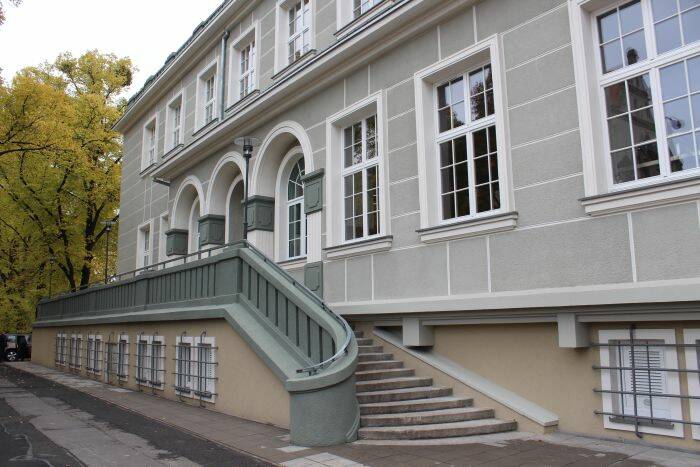
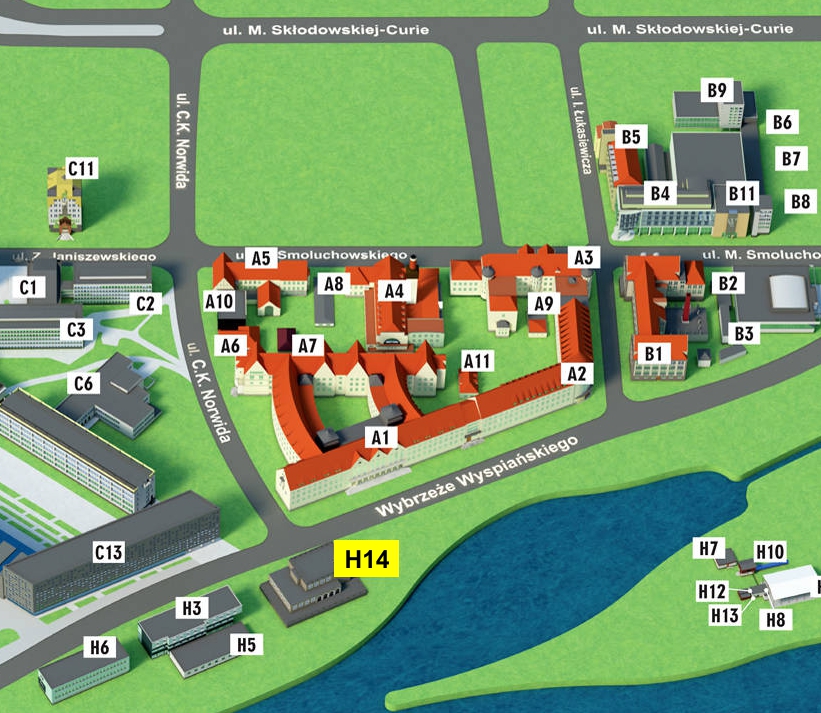
ISPEM 2025 will take place in Wroclaw, the chief city in south-western Poland. Over the centuries the city has been either part of Poland, Bohemia, Austria, Prussia or Germany. Wroclaw is an excellent example of a multicultural metropolis situated at the interface of ethnically diverse areas. The architecture of Wroclaw reflects its history, which dates back almost one thousand years.
Copyright © City and Tourism Promotion Office
Click here to read about tourist attractions in Wroclaw
Wrocław – European Capital of Culture 2016
As the largest city of Lower Silesia, Wrocław is the region’s administrative, economic and cultural capital. Standing on twelve islands on the Oder river and its four tributaries, it is often called the Venice of the North. It is a city with a thousand years of history: it passed from the hands of Czech kings under the rule of Austria, and then Prussia; finally, after the Second World War, it became a part of Poland. Today, the heritage of the past intertwines with modernity. As a city open to new ideas and challenges, Wrocław has gained a reputation as dynamic and innovative. It boasts a broad cultural and entertainment offer, and it is considered to be one of the most business-friendly cities to boot. Its atmosphere attracts people from all around the country and the world. It is the visitors who say Wrocław is the place that must be seen first and foremost when coming to Poland.
Welcome to Wrocław!
Tourist attractions
Wrocław’s monuments can be admired in a variety of ways: while taking an individual walk or a guided tour, or while travelling by an electric car, a bike, a historic tram or a cab. It is also worthwhile seeing the city view from a boat on the Oder river or from one of the observation towers. Apart from exploring Wrocław’s history, we invite you to search for its smallest citizens.
Dwarfs are Wrocław’s pride: the citizens have already set up more than 300 dwarf statuettes. They have blended in so well with the cityscape that few question their origin or number anymore. Additional information on dwarfs can be found on the dedicated website: www.krasnale.pl/en/.
Ostrów Tumski (Cathedral Island) is the oldest part of Wrocław. Surrounded by the waters of the Oder, the former stronghold which gave rise to the city comprises beautiful architectural monuments. The most impressive among them are the Gothic St. John the Baptist’s Cathedral and the Holy Cross Church, restored after the Second World War. The Archdiocesan Museum’s collection includes the Book of Henryków, a unique document containing the first sentence written in Polish, inscribed in 2015 on the UNESCO Memory of the World Register.
The Market Square is the heart of Wrocław, an entertainment centre full of pubs and restaurants, throbbing with life at any time of day or night. The centre of the square is built up with the Cloth Hall and the City Hall, a unique monument of Gothic and Renaissance architecture, one of a kind in the whole of Europe. It also houses the oldest restaurant in Europe: Piwnica Świdnicka. In front of the City Hall’s eastern façade, there is a pillory, and in front of the western one, a monument to the playwright Aleksander Fredro brought from Lviv. The market square is bordered by historic burgher tenements, banks and department stores.
Ulica Świdnicka is the most renowned promenade and historic shopping street in Wrocław. It is here that we can see the neo-classical building of the Wrocław Opera House and the nearby Wrocław Puppet Theatre. The street also leads to popular entertainment spots: the Musical Theatre ‘Capitol’, Dolnośląskie Centrum Filmowe (Lower Silesia Film Centre) and pubs along ulica Bogusławskiego. Another attraction worth seeing is an unconventional Monument of an Anonymous Passerby at the intersection of ulica Świdnicka and ulica Piłsudskiego. It is also here that the showpiece of the European Capital of Culture Wrocław 2016 has been located: the information point Barbara at the site of a former famous Wrocław bar.
The National Forum of Music is the newest concert hall building in the very centre of Wrocław. The modern building, with acoustics equal to the best in the world, houses four halls: the main hall with a capacity of 1800 and three chamber halls with 800 places in total. NFM has already had many renowned artists among its guests, and concert tickets sell out very quickly.
The Royal Palace with a baroque garden is the seat of the modern Historical Museum. Visitors can discover the city’s history by seeing the exhibition “1000 years of Wrocław”, as well as explore the royal apartments.
Connecting ulica Kiełbaśnicza and ulica Odrzańska, there is a small street paved with fieldstone: Jatki (butchers’ stalls), where poultry and meat from the municipal slaughterhouse were sold since the 12th century. Nowadays, it houses the city’s artists’ ateliers, painting and weaving galleries. A reminder of Jatki’s old function is an unusual Monument of the Butchery Animals.
The District of Four Denominations is a unique place, encompassing the area of ulica Kazimierza Wielkiego, ulica św. Antoniego, ulica Pawła Włodkowica and ulica św. Mikołaja. Its name refers to the fact that there are four temples of different denominations in close proximity to each other: an Orthodox church, a Roman Catholic church, a Protestant church and a synagogue. The area is especially lively in the evenings, as local discos, cafés and pubs attract crowds of people.
The University of Wrocław is situated in the largest baroque complex of the city, formed by the former Jesuit academy and church. It is the oldest alma mater in Wrocław. The main building houses the Museum of the University of Wrocław, which holds the pearl of the Lower Silesian baroque, the Aula Leopoldina, and the Oratorium Marianum, a hall in which concerts have been taking place for 200 years. The Mathematical Tower houses an old astronomical observatory.
Nearby, in a baroque building of a former cloister, the National Ossoliński Institute has had its seat since 1946. The centrepieces of its collection include the manuscript of the Polish national epic “Pan Tadeusz” by Adam Mickiewicz, engravings by Artur Grottger and Rembrandt, a denarius of Mieszko I (the first historical Polish ruler), a seal of king John I Albert and medals of the last Jagiellonians.
The former artisanal district, Nadodrze, has been changing in recent years. Tourists come here attracted by restored façades, renovated courtyards, parks and greens, murals, and in particular by the unique atmosphere of cafés, galleries, artist ateliers, author’s boutiques and other places which offer workshops, discussions, film showings and meetings with interesting people.
The Panorama of Racławice is a unique depiction of the Battle of Racławice. 15 metres tall and 114 metres long, the painting by Jan Styka and Wojciech Kossak is housed in a specially constructed rotunda. The ticket to the Panorama of Racławice also grants admission to the permanent exhibitions in the National Museum.
The Botanical Garden was founded in 1811. Its plants, of which there are more than 11,500 species and varieties, come from natural habitats and botanical gardens from all around the world. On the garden’s premises, there is the oldest and the largest Museum of Natural History in Poland.
Szczytnicki Park is the oldest and one of the largest parks in the city. Its main attraction is the Japanese Garden, created in 1913. Szczytnicki Park with its arboretum, beautiful rhododendron groves, a rose garden and the Japanese Garden has been entered in the register of art monuments.
The Centennial Hall (Hala Stulecia) is one of the most significant works of 20th century architecture. It was designed by the eminent architect Max Berg and constructed in 1913. The early modernistic domelike edifice of reinforced concrete has a vault with a diameter 1.5 times greater than the Roman Pantheon with only 42% of its weight. It has been extended with a congress centre and hosts both regional and international congresses as well as trade, sports and cultural events. In 2006, it was inscribed on the UNESCO World Heritage List. Its history can be explored in the Discovery Centre. Other attractions worth seeing include the Four Domes Pavilion and the Plastic Panorama of Old Lviv.
A multimedia fountain is just next to the Hall. With a surface of 1 ha, it is one of the largest fountains in Europe. Its basin contains 300 water nozzles of different types, able to spurt water up to 40 metres, and 3 fire nozzles. There are also 800 light points on the basin’s bottom. All of these elements contribute to free multimedia shows to the rhythm of music, accompanied by projections and laser lights. The shows’ programme can be found on the website www.wroclawskafontanna.pl. In winter the fountain turns into a skating rink.
The Wrocław Zoological Garden is the oldest and the largest (in terms of species variety) zoological garden in Poland. On its premises, there are a couple of historic buildings from the 19th century, such as the bears’ tower, the elephants’ pavilion and the apes’ pavilion. The newest attractions include the Africarium: a unique complex, with few equals in the world, presenting the aquatic environment of Africa.
The Wrocław Partynice Racecourse was opened in 1907. Nowadays, it hosts the most important horse races, such as Oaks: a race of three-year-old thoroughbred fillies. The event is even more splendid thanks to ladies in fancy hats.
The Wrocław Stadium, built for the EURO 2012 European football championships, is the most modern multi-purpose structure in Lower Silesia. It has a distinctive lantern shape and can seat 42,771 spectators. It hosts various sports and artistic events.
The Oder river, its tributaries and channels make Wrocław a unique city of 12 islands. The riverbanks and islands are joined by more than 100 bridges and footbridges. One of the oldest ones is the Piaskowy bridge, mentioned in 12th-century documents. The most famous one, however, is the Grunwaldzki bridge, formerly called the Emperor’s bridge, owing its popularity to the original suspended structure and unique location. In 2004, the Millennium Bridge was built, while in 2011, the Rędziński bridge, which is the longest single-pylon cable-supported bridge in Poland and the largest, in terms of surface, bridge of reinforced concrete in the world. Other unique bridges include the Tumski bridge, also known as the lovers’ bridge, and mostek Pokutnic (the bridge of Penitents), the highest situated bridge in Wrocław.
Copyright © City and Tourism Promotion Office

Wroclaw University of Science and Technology is the leading scientific and educational centre in Poland with 33,000 students being educated by 2000 academic teachers in 16 faculties. Its position among technical universities in both Europe and the rest of the world is increasing every year. Development of the University is confirmed by research potential, didactics at the highest level, innovation and also cooperation with industry. The University educates specialists who are valued and sought after in the labour market.
Accommodation
Hotel Wodnik
Stara Biblioteka
Zoo Hotel
Happy Living Villa
There is a possibility of accommodation in student dormitories of the Wrocław University of Science and Technology. If you are interested, please contact: anna.burduk@pwr.edu.pl
Travel to Wroclaw
Choose your means of transportation
Closest airport is Wrocław Copernicus Airport
~60 minutes by public transport (Bus 406 to Dworcowa (near Central Railway Station) and then bus 145/146 to Plac Grunwaldzki. Buses leave every 20 minutes. 60-minutes ticket for all transportation is PLN 5,20/person.
~30 minutes by taxi. PLN 80,-
Taxi options are listed here: Airport website
Closest long-distance railway station Wrocław Central Station. 10 minutes by public transport (stop “Dworzec Główny PKP” to “Plac Grunwaldzki”). Trams and buses leave every 5 minutes.
